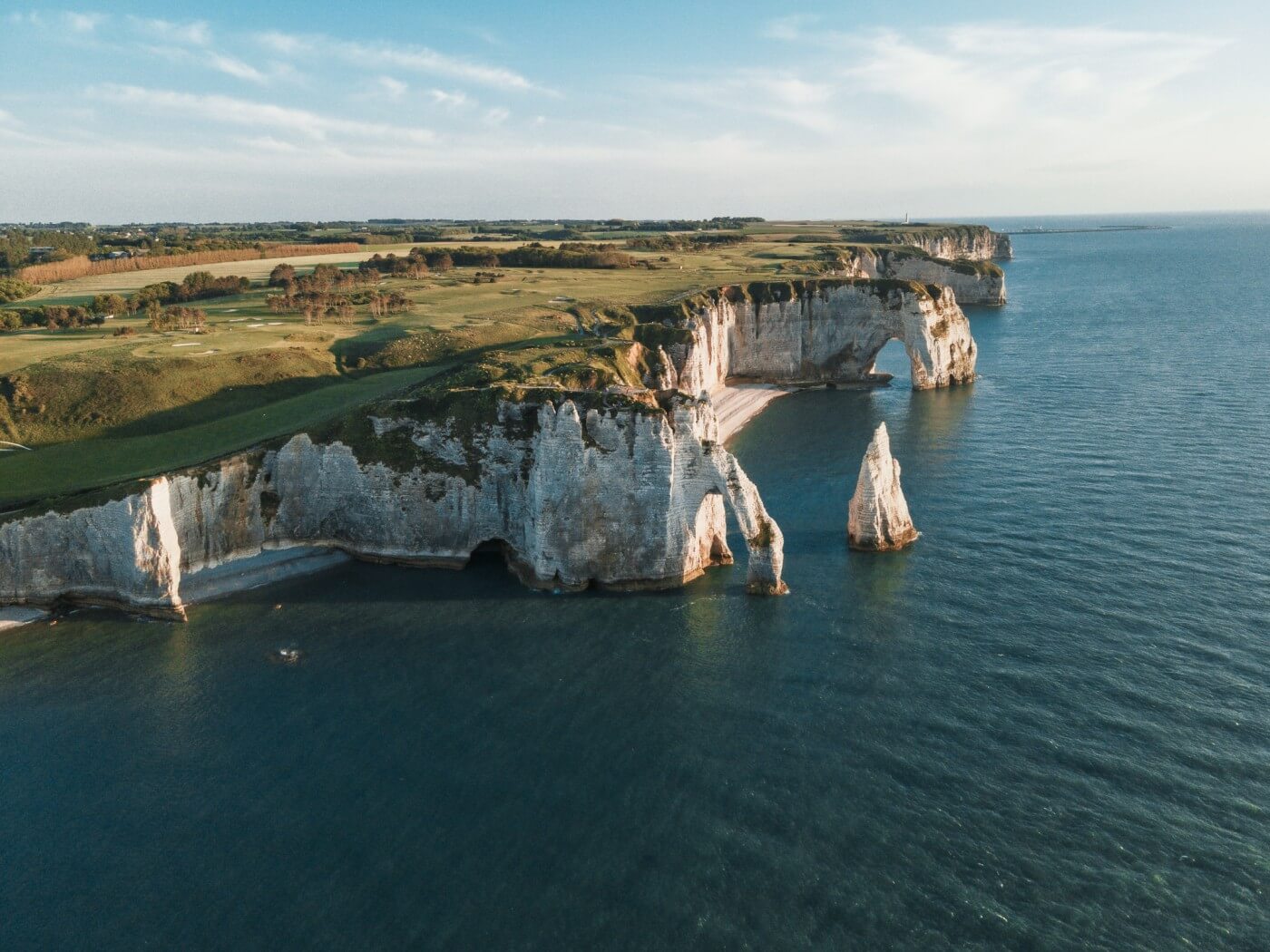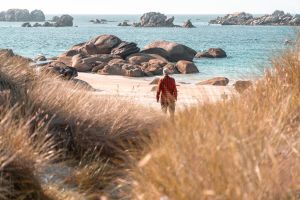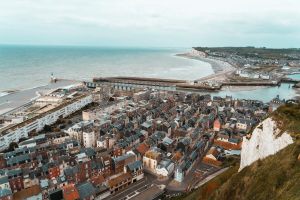On this road trip, I will take you on an unforgettable journey along one of the most beautiful stretches of coastline in the north of Normandy. From Le Tr├®port to ├ētretat, you will follow the spectacular white limestone cliffs, pass through dreamy Norman villages with their picturesque half-timbered houses and discover the fashionable seaside resorts with their colorful villas and beach huts.
The gentle, green hills of the Alabaster Coast offer you breathtaking views of the endless sea ŌĆō while you breathe in the fresh sea air, listen to the screeching of the seagulls and the sound of the waves and enjoy the feeling of endless freedom. So, put a baguette under your arm and come along.
When you stand at the foot of the white limestone cliffs and look up at the cliffs, you are sometimes left speechless.
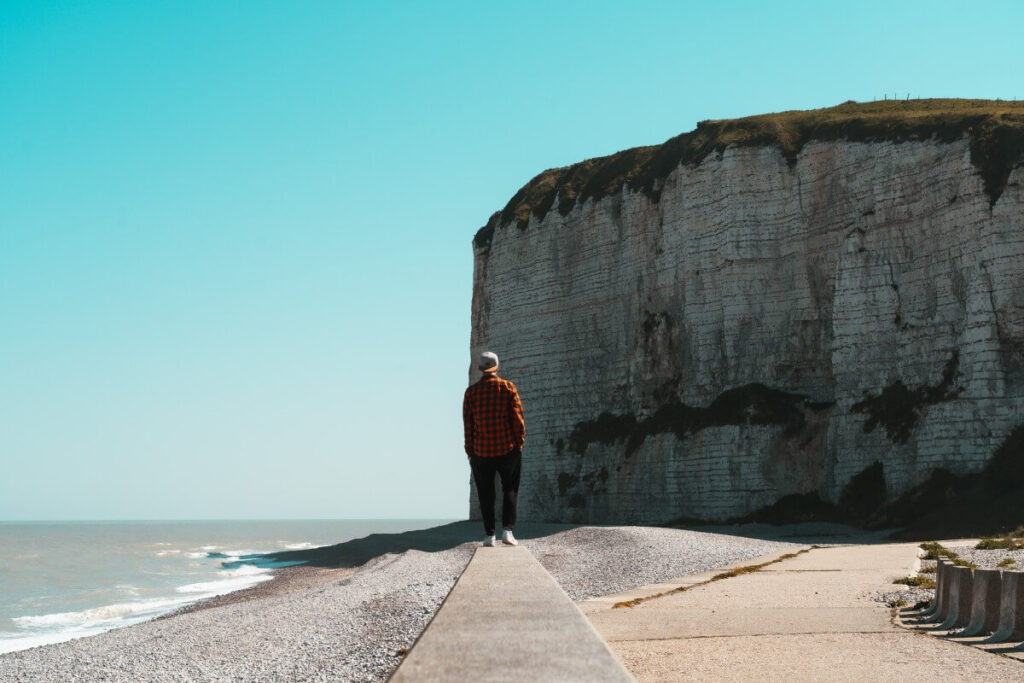
At least thatŌĆÖs how I often felt on my road trip along the Cote dŌĆÖAlbatre (alabaster coast) from Le Tr├®port to ├ētretat. This coastal region in the north of France takes its name from the characteristic alabaster-colored chalk cliffs. And these cliffs are your constant companions along the entire route. You will repeatedly visit fantastic spots from which you can marvel at this wonder of nature.
¤īŖ Note: The Alabaster Coast (French: C├┤te dŌĆÖAlb├ótre) stretches around 120 km along Normandy in the north of France from Le Havre (at the mouth of the Seine) to Le Tr├®port (on the border with Hauts-de-France). ¤Ś║’ĖÅ
¤Å×’ĖÅ The name is derived from the impressive white chalk cliffs, which are up to 120 meters high in many places. Ōܬ’ĖÅ
¤ōÜ The Alabaster Coast is known for its picturesque coastal towns, beautiful beaches and was often chosen as a motif by Impressionist artists. ¤Ä©
Many of the maritime resorts along the Cote dŌĆÖAlbatre are quite similar, whether large or small. There is almost always a casino, a harbor with a beach promenade and a carousel. But each town also has its own special features that are worth discovering. In this article, IŌĆÖll show you which of these you shouldnŌĆÖt miss, but also give you a few tips on quieter areas along this Alabaster Coast route where not so many visitors stop.
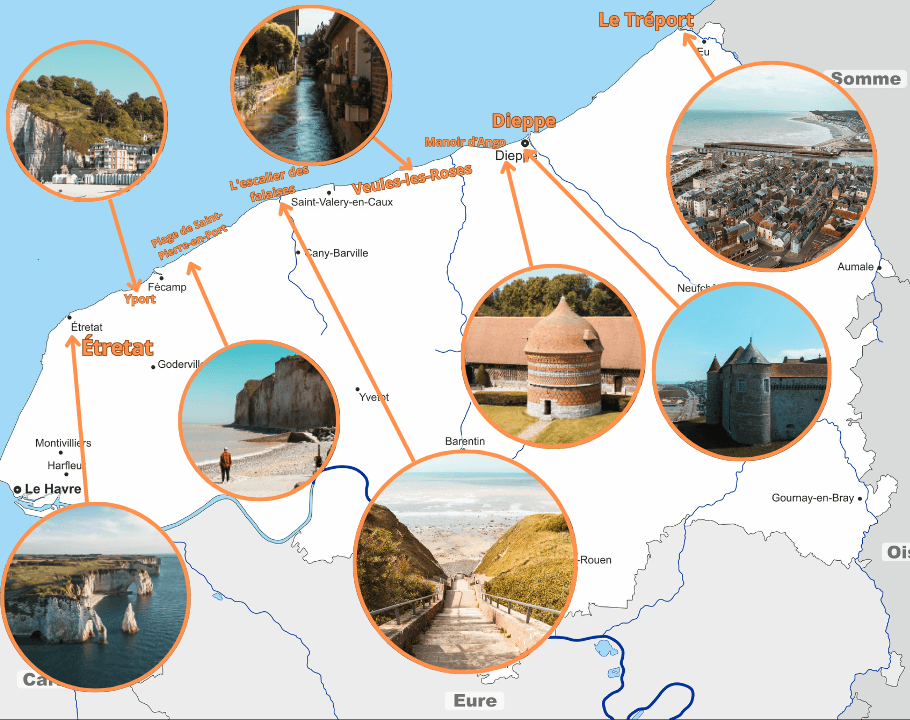
How long on the Alabaster Coast?
You can complete this route along the Alabaster Coast in a relaxed 5 to 7 days. It is worth staying more than just one night in Etr├®tat and Le Tr├®port to discover all the highlights in peace and quiet and in different light moods.
Best starting point for a road trip along the Alabaster Coast?
I myself started my road trip in Le Tr├®port and then drove further and further west. The route recommendation in this article is designed so that you can continue on towards the C├┤te Fleurie afterwards.
However, it is also possible to simply reverse this route here. This is particularly advisable if you are traveling via Le Havre, the largest city in the region.
Rental car or camping?
The Alabaster Coast is actually perfect for a road trip with a rental car, as there is plenty of accommodation and vacation apartments along the way. Even in the high season, you can usually find something spontaneously. Campsites are somewhat rarer and book up quickly in the high season.
One major disadvantage is the journey. There is no major airport in the region and you usually have to travel to Paris by train and then on towards Le Havre. ItŌĆÖs better if you arrive by rental car or your own car from home.
Here you can find good rental cars for your route. Simply enter your start and end point and compare the best offers:
Accommodation along the Alabaster Coast
The Cote dŌĆÖAlbatre is a very popular region for short trips in France. Tourists from Paris in particular like to come here, as the coast is only around 2 hours away from the French capital.
There is a correspondingly wide range of accommodation options here. I myself was traveling by van and always stayed at campsites, but in this article I will also give you tips for good hotels if you are traveling with a normal rental car.
Vacation apartments are also a popular accommodation option on the Alabaster Coast.
Camping along the Alabaster Coast
There are not as many campsites along the Alabaster Coast with all the trimmings as you might be used to in other countries. The sanitary facilities on the sites are often a little older and many of the sites now offer more mobile homes (small vacation apartments) than pitches for campers or caravans.
Nevertheless, I think a camping tour is worthwhile. Because if you get the coveted pitches right on the coast, you can enjoy the sunset to the sound of the waves. You can also do that in a hotel, but camping still gives you that road trip feeling of freedom.
- You should note that many campsites do not offer Wi-Fi, and if they do, it is usually very slow and not secure. You should therefore get a correspondingly large mobile contract or a prepaid SIM card for France in advance.
- Often there is also no toilet paper or soap in the campsite bathrooms. So you should have that with you.
¤ÜÉ Note: If you canŌĆÖt find a campsite: Almost every Carrefour supermarket also has a few pitches for motorhomes. ¤Å¬
The pitches are often basic and rarely beautifully situated, but they are free and perfectly adequate for one night. ¤ÆĖŌÅ│
¤æŹ Perfect for a spontaneous stopover without much effort!
1. Arrival in Le Tr├®port & Mers-les-bain
- Day 1 to day 3: 2 overnight stays
- Accommodation tip: Hotel Le Saint-Yves
- Campsite tip: Camping Municipal Parc du Château
Le Tr├®port is considered the gateway to the Alabaster Coast and is an ideal starting point for your route.
The charming seaside resort impresses with its historic harbor district, the spectacular white chalk cliffs and its proximity to the neighboring towns of Mers-les-Bains and Eu. While you stroll through the narrow streets of the Quartier des Cordiers or take the free elevator up to the cliffs, you can enjoy fantastic views of the sea. The colorful Belle ├ēpoque architecture in Mers-les-Bains, the magnificent castle of Eu and the fresh Atlantic air on the coast will put you in the right mood for the other highlights of the Alabaster Coast.
You can find much more information about this region in the following article:
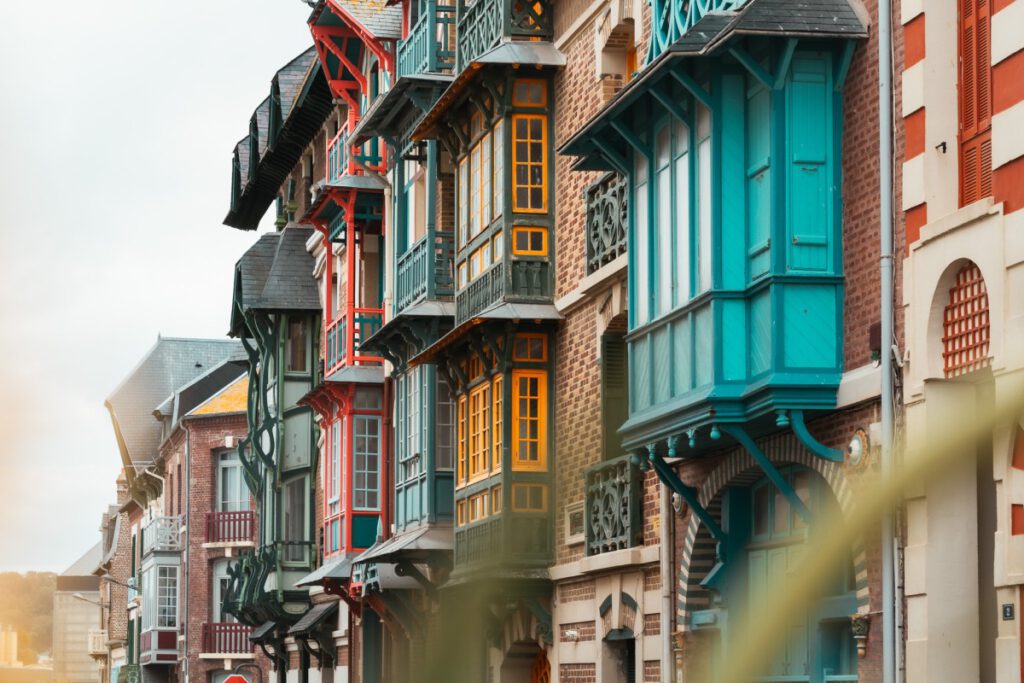
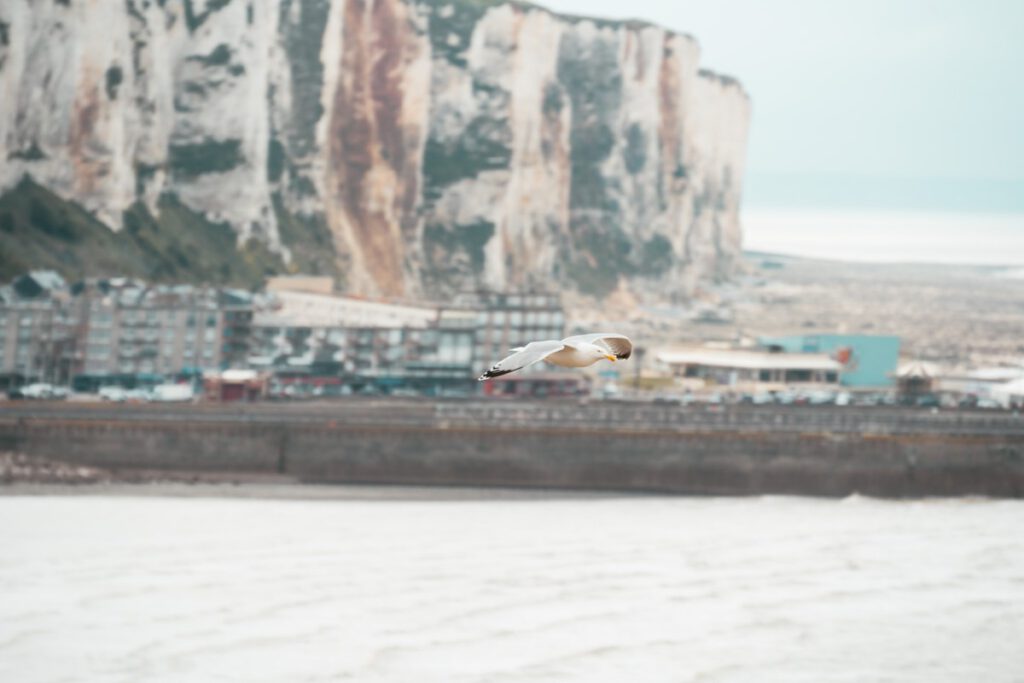
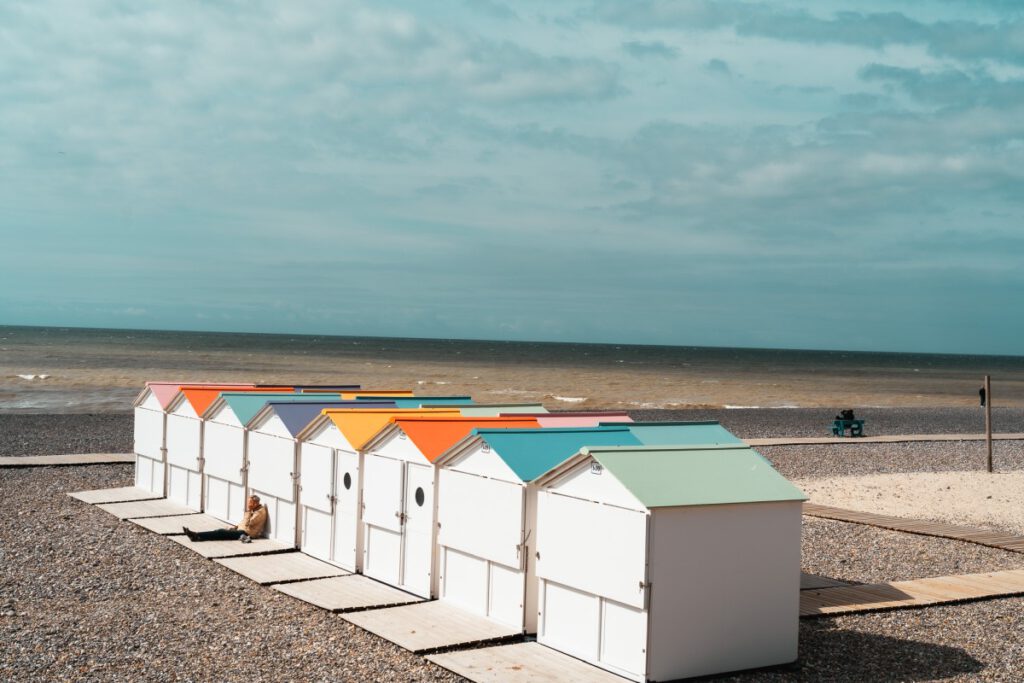
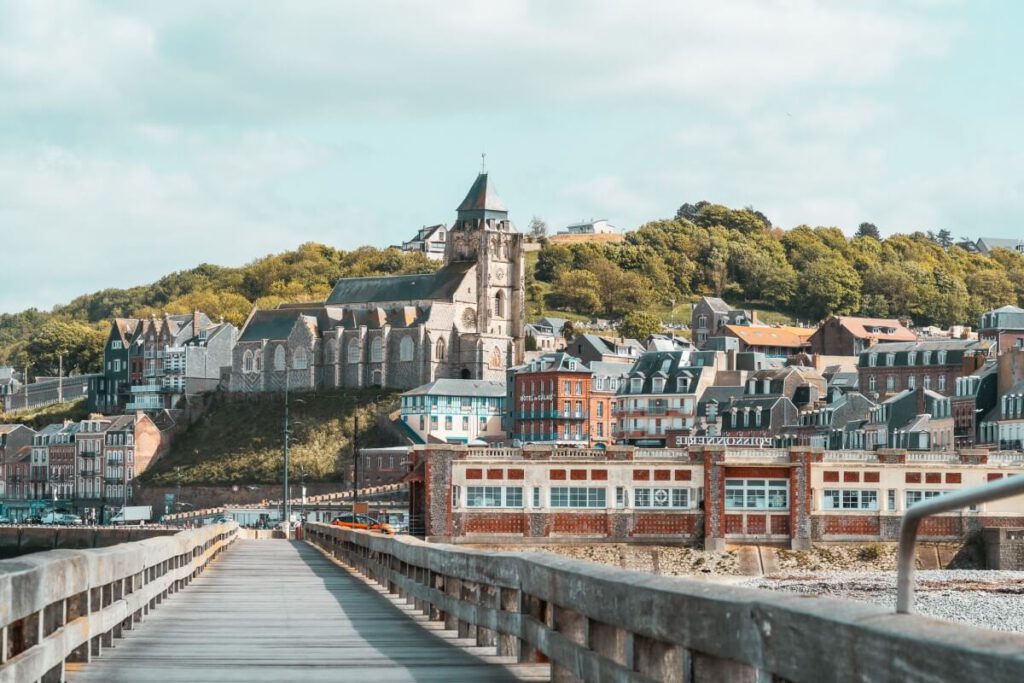
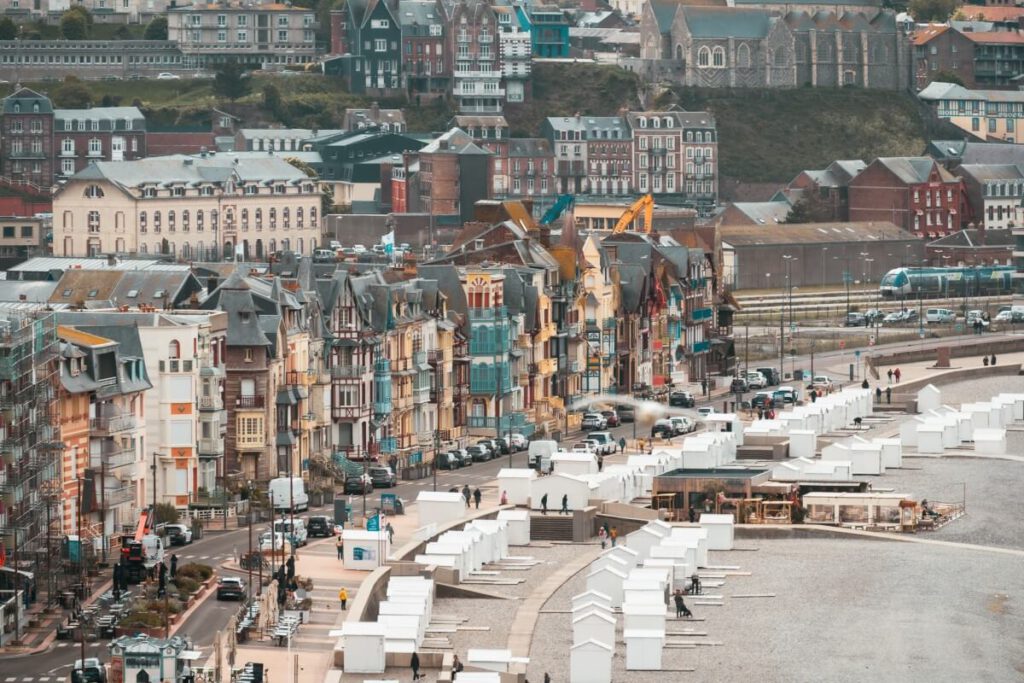
2. Le Tr├®port to Veules-les-Roses
- Day 3: 1 overnight stay
- Accommodation tip: Relais H├┤telier Douce France
- Camping tip: Camping Du Grand Sable
On day 3, you set off in the morning in the direction of Dieppe. There you can explore the city for a few hours. There are also a few more highlights to discover on the way to your next overnight stay.
Dieppe
The coastal town of Dieppe, which only has around 30,000 inhabitants, is best known for its medieval castle. You should definitely visit it and soak up the view over the rooftops of the town from the various vantage points.
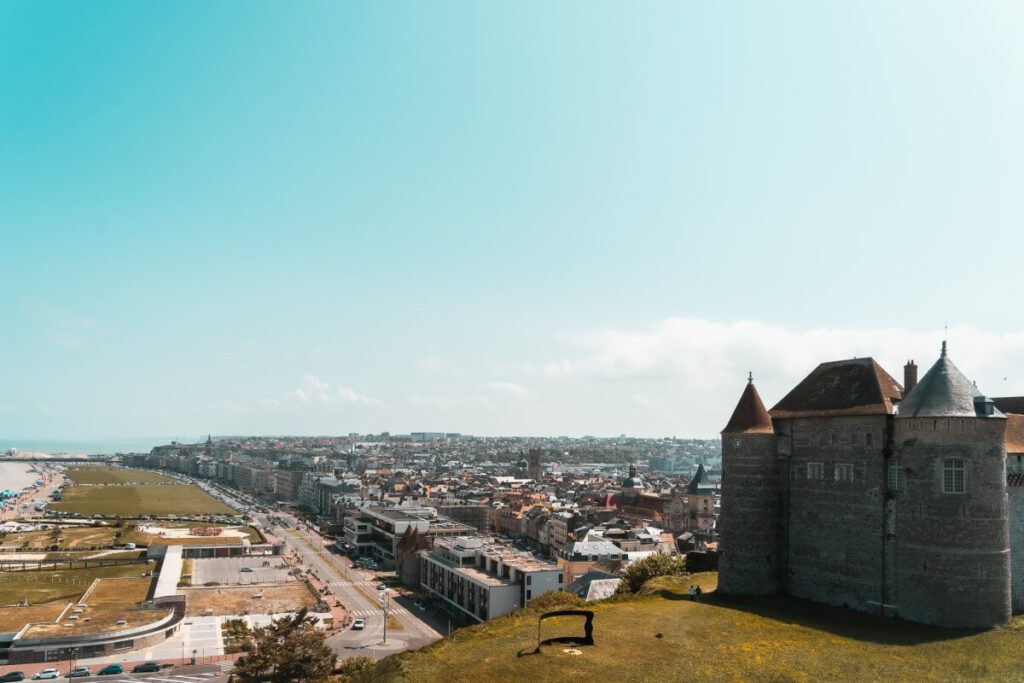
The town also has a lively harbor, a beautiful marina for long walks and a number of historical sights. The spiritual heart of the city is Saint-Jacques Cathedral. I was particularly impressed by the graceful, almost mysterious atmosphere created by the soft light coming in from outside through the ornately decorated stained glass windows.
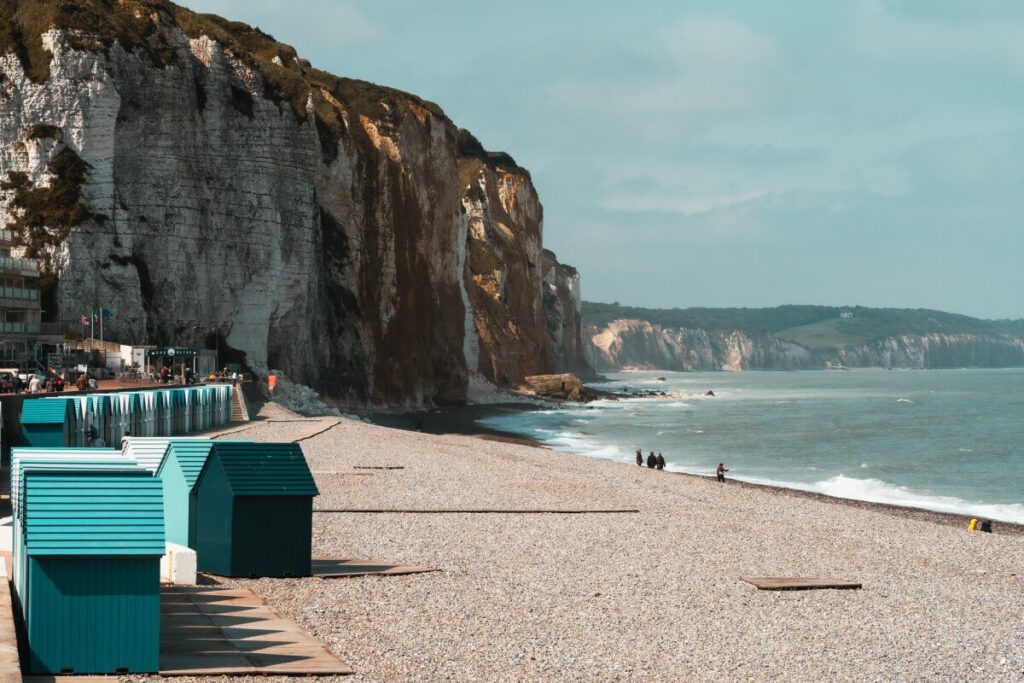
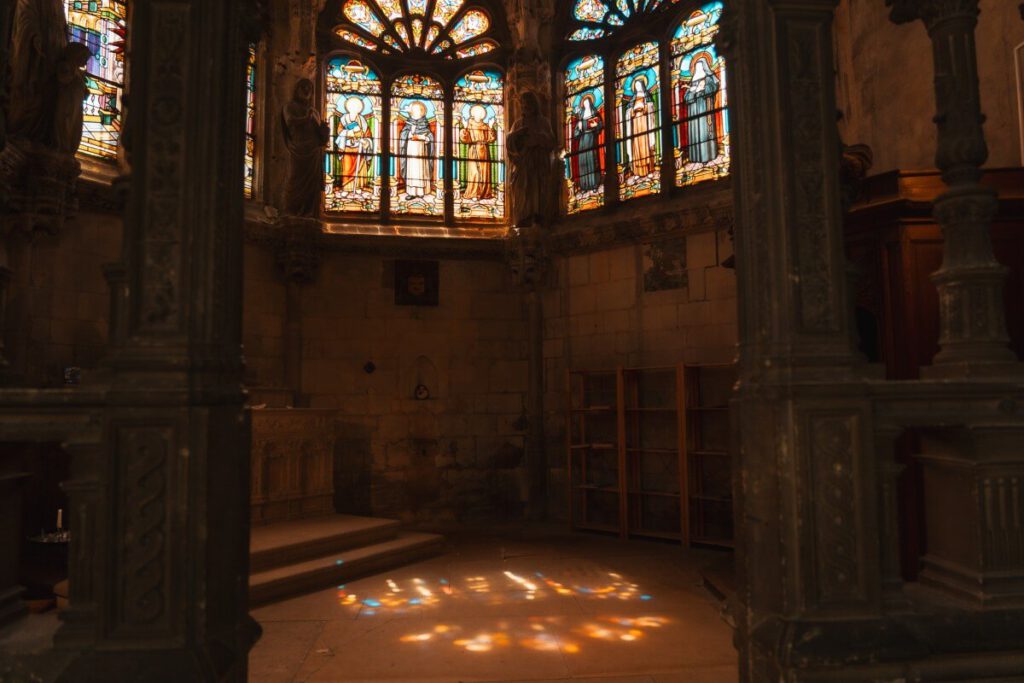
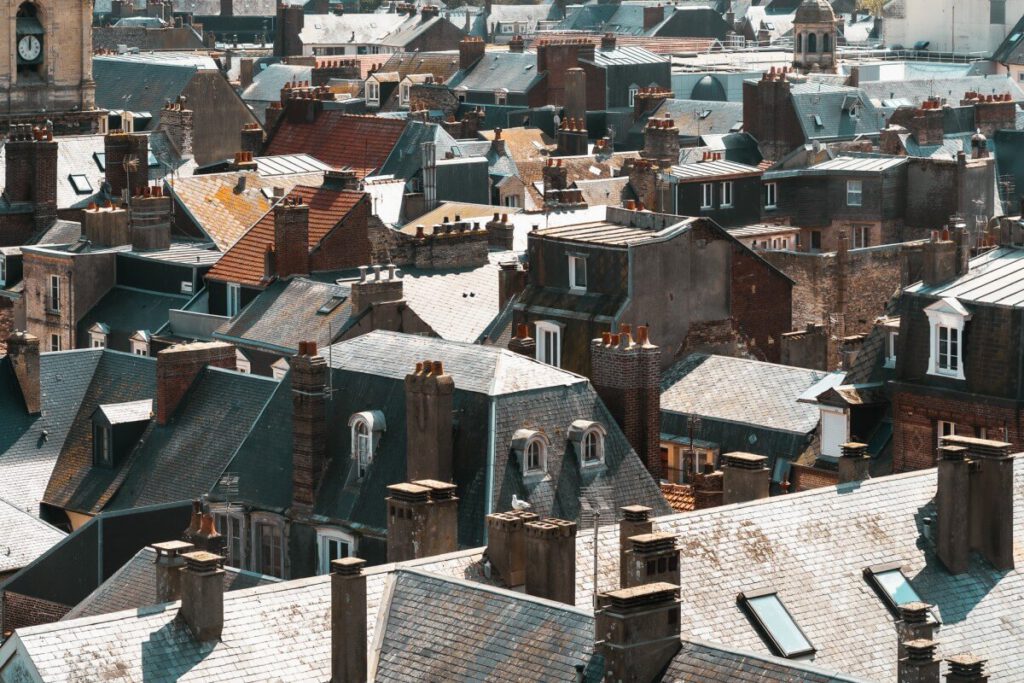
Belv├®d├©re de Hautot-sur-Mer
It is worth making a short stop at the Belv├®d├©re de Hautot-sur-Mer, a little west of Dieppe. From this viewpoint directly on the road, you have a great view of the bay.
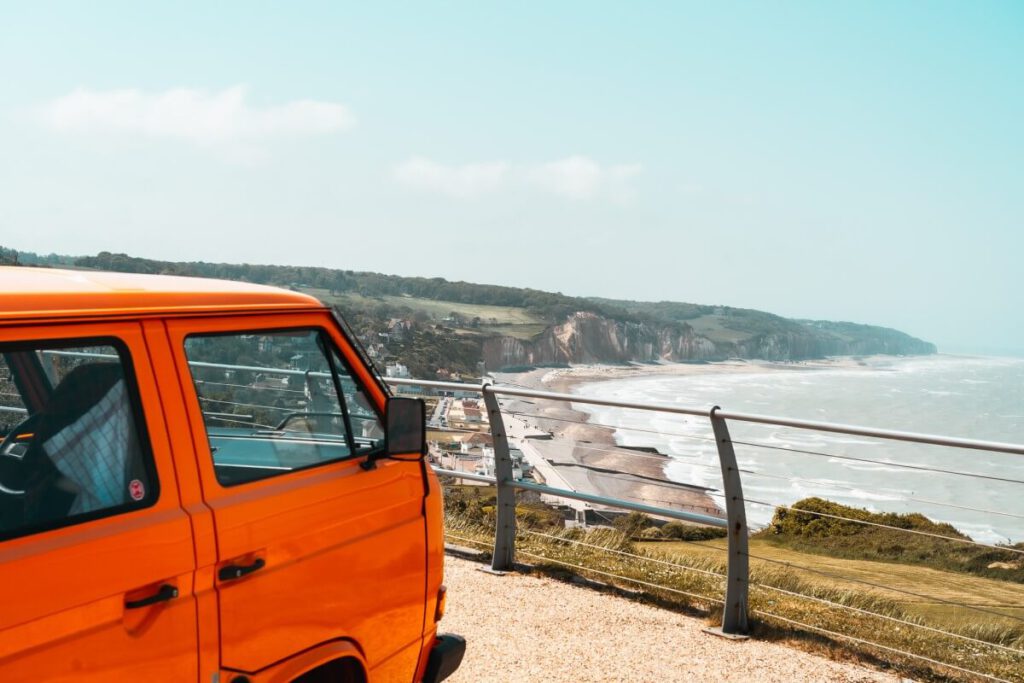
Manoir dŌĆÖAngo
This listed manor house is a historical monument that you should definitely visit. It was built around 1530 by a wealthy shipowner from Dieppe and contains Byzantine-inspired elements, a pleasure garden and magnificent rooms.
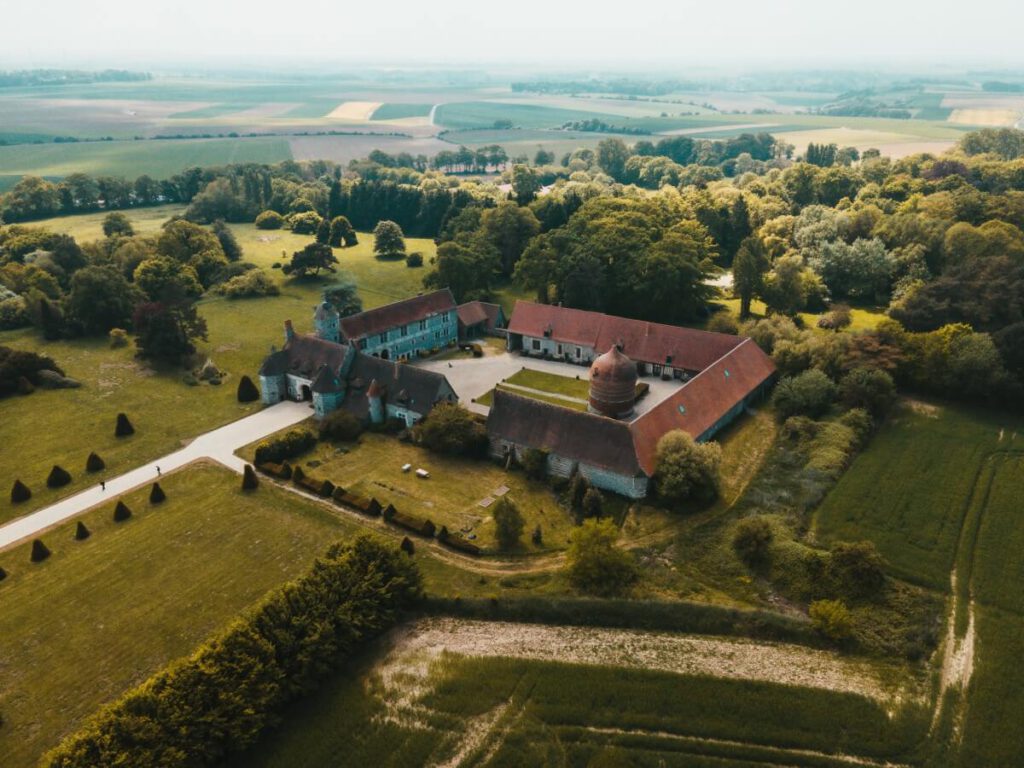
Inside the rooms, you will learn more about the history of the country estate and its owners. In total, you should allow around 30 to 60 minutes for this. If you would like to explore the area around the property in more detail, it will take around 1.5 hours. The entrance fee to the Manoir dŌĆÖAngo is Ōé¼5.50.
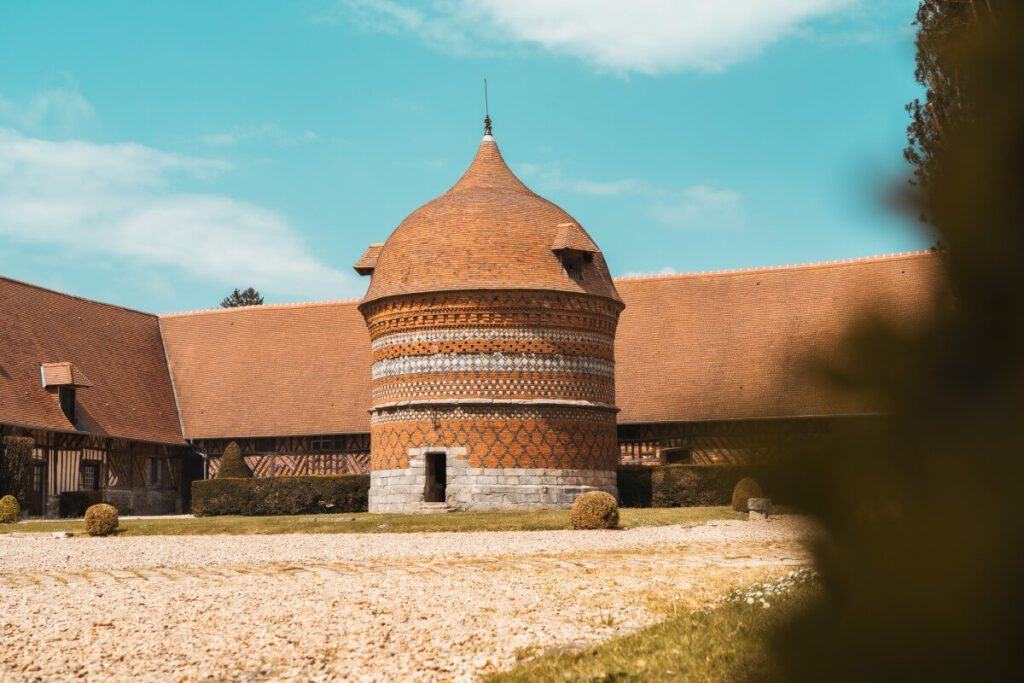
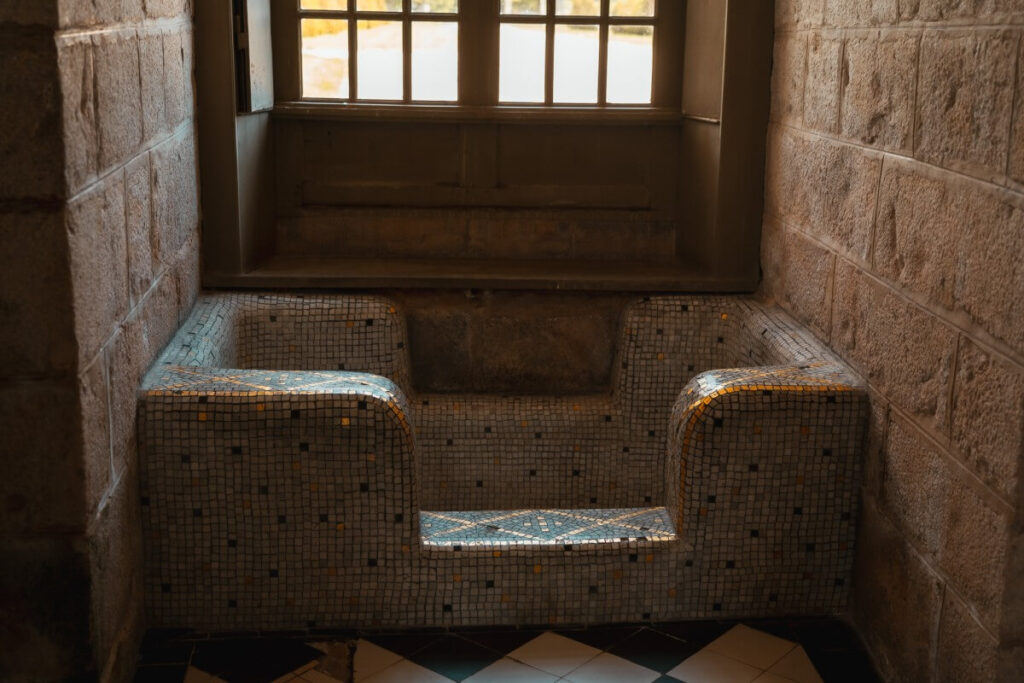
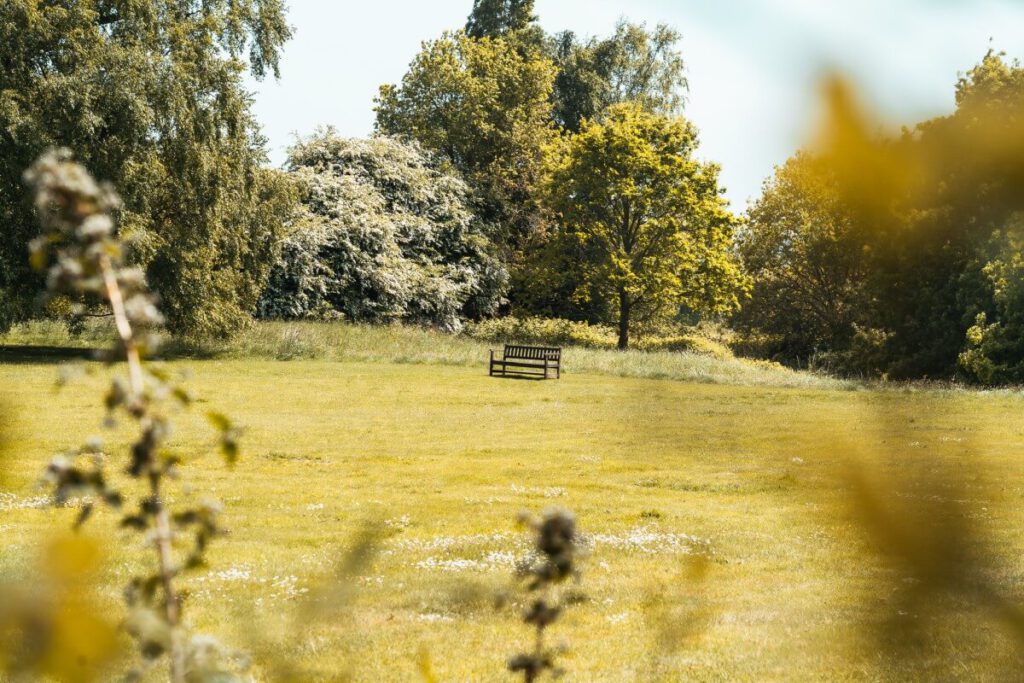
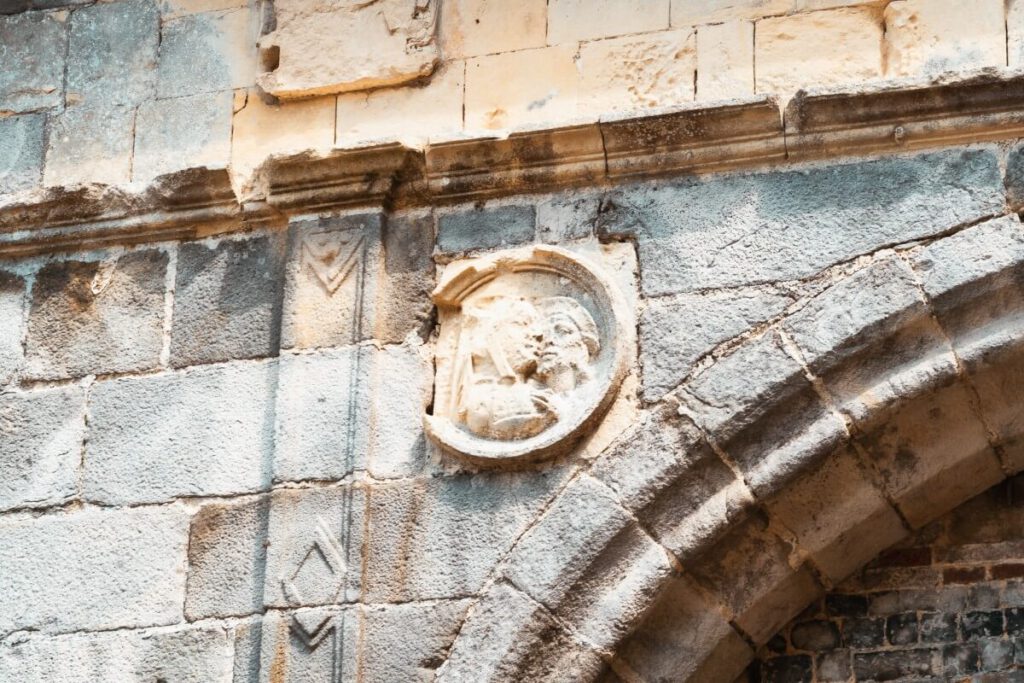
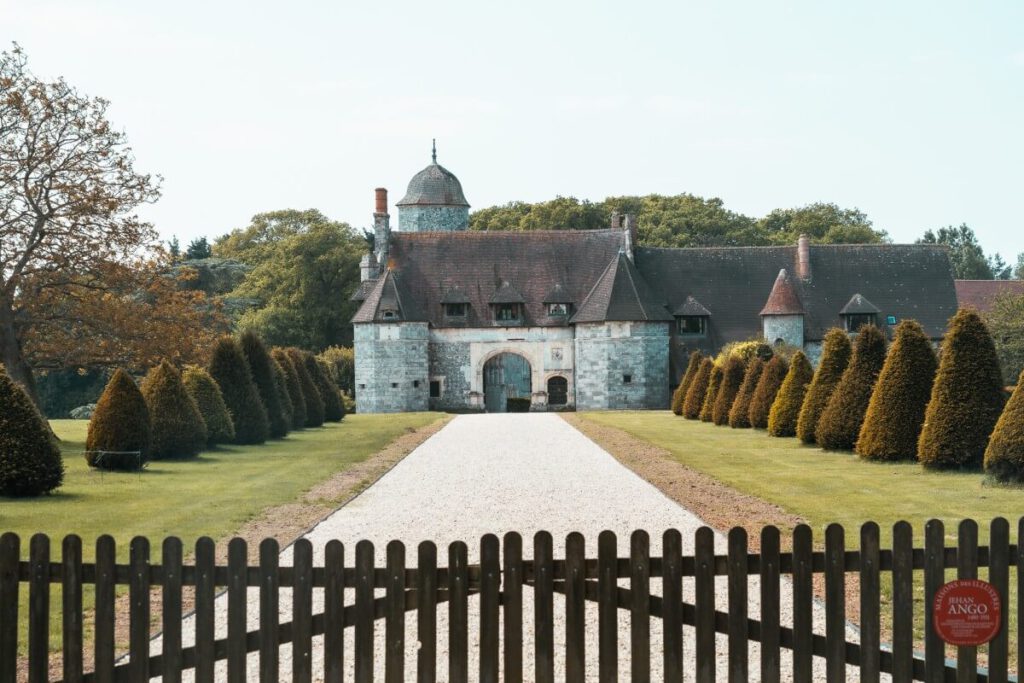
Camping Du Grand Sable
If you prefer to camp rather than stay in Dieppe or Veules-les-Roses, then this campsite is a highlight. It is often fully booked, but you can try to get one of the only 11 available pitches for one night.
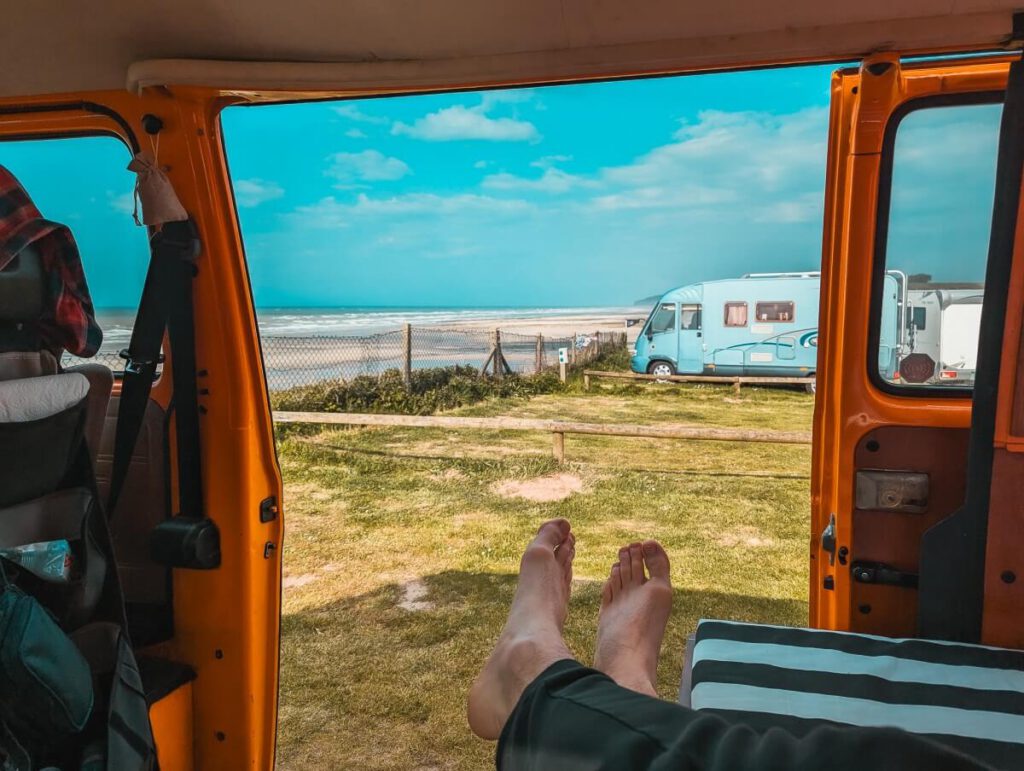
In the low season, it is the only pitch along the coast with a direct view of the sea ŌĆō which turns a glorious red and orange at sunset.

The pitches feel like youŌĆÖre looking out to sea from your balcony. You also have direct access to the beach.
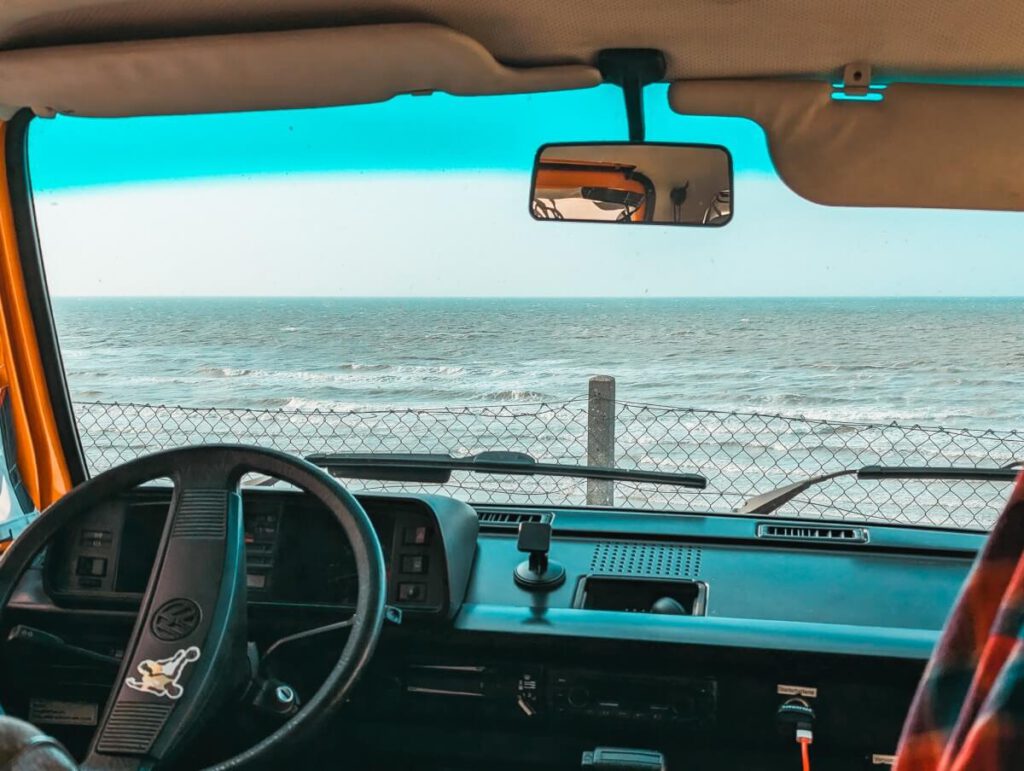
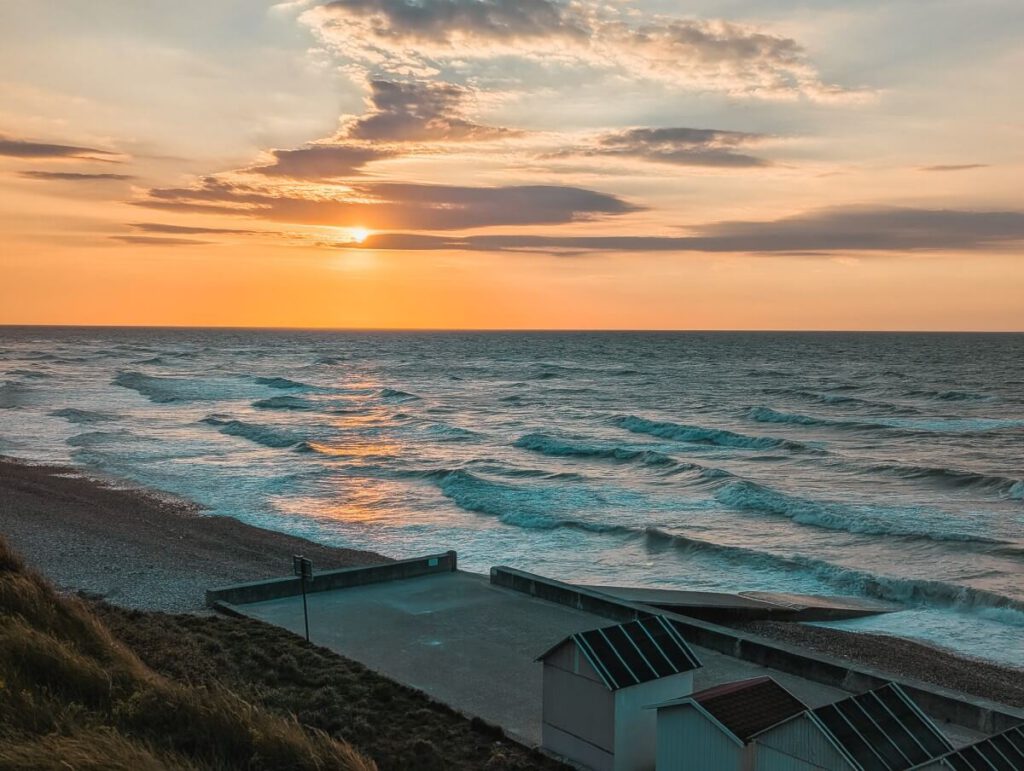
LŌĆÖEscalier des falaises
Along the entire route along the Alabaster Coast, there are always small gorges between the rocks. One of the most beautiful are the LŌĆÖEscalier des falaises (literally: ŌĆ£stairs of the cliffsŌĆØ).
A long staircase leads all the way down here. In the middle, you have a great view directly to the side of the steep cliff. In the background, the sea spray crashes against the rocks.
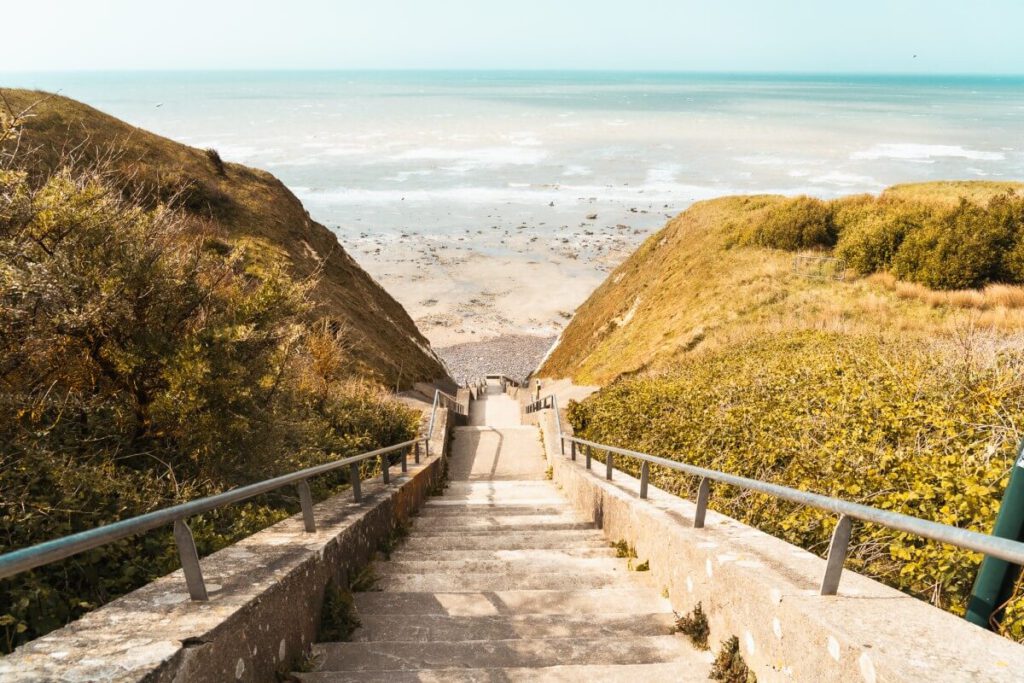
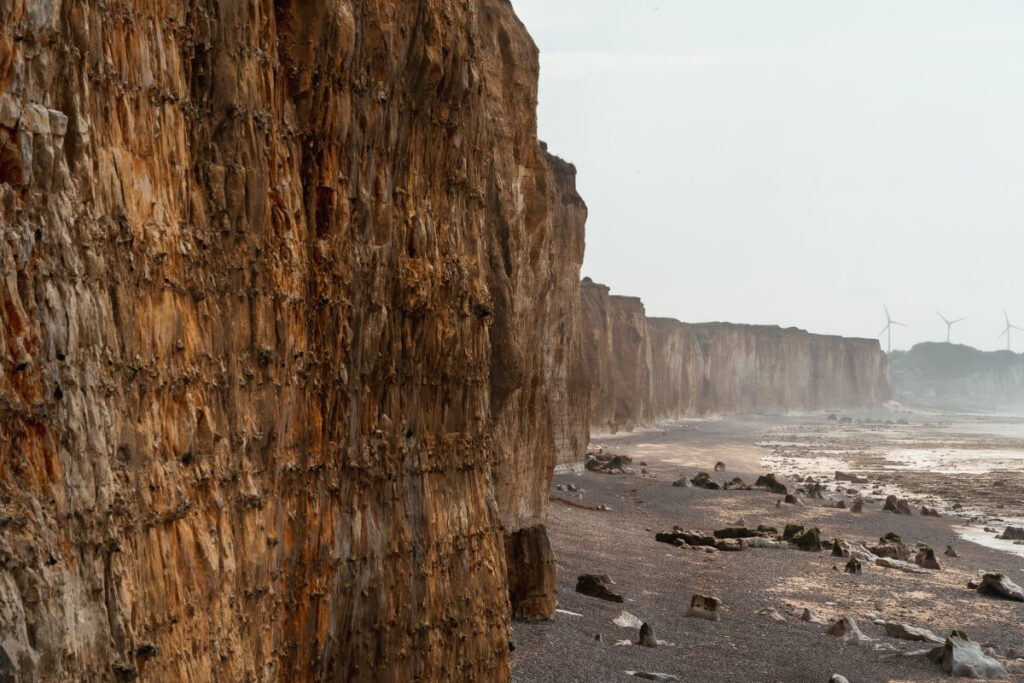
Veules-les-Roses
Here in Veules-les-Roses, flows the Veules, FranceŌĆÖs shortest river. It is just 1149 meters long. Les Roses means ŌĆ£the rosesŌĆØ. The addition was introduced in 1897 when the village became more touristy and attracted many visitors and artists from Paris.
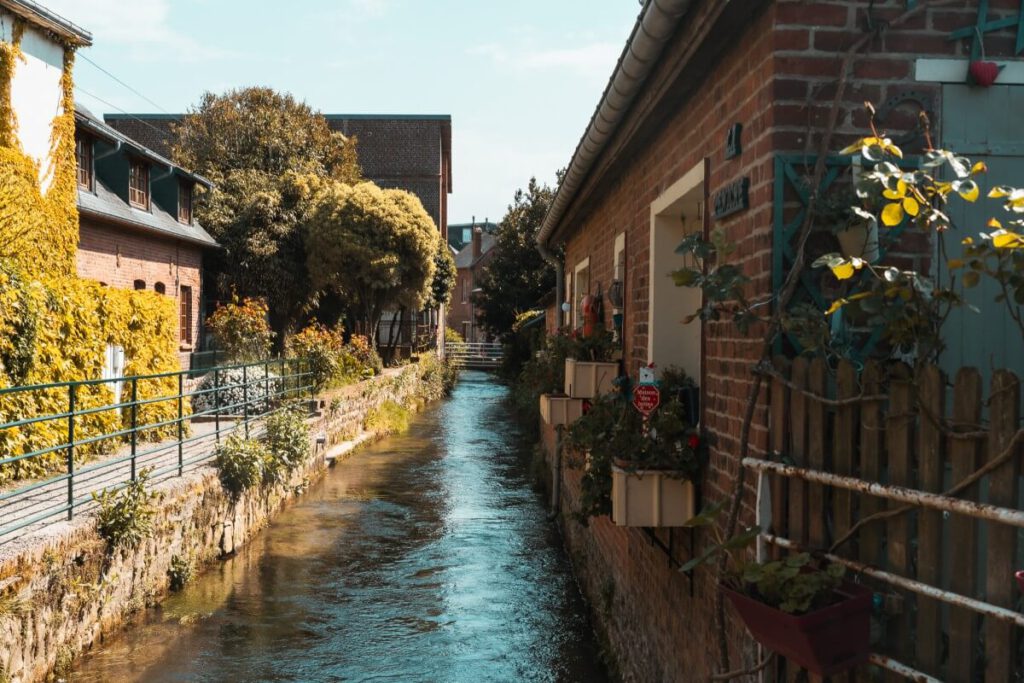
In 2017, the village was even awarded the title ŌĆ£Les plus beaux villages de FranceŌĆØ, making it one of the most beautiful villages in France.
An idyllic path leads along the river from its source to its mouth in the English Channel. On a walk, you will pass water wheels, picturesque half-timbered houses and lots of romantic gardens full of colorful flowers.
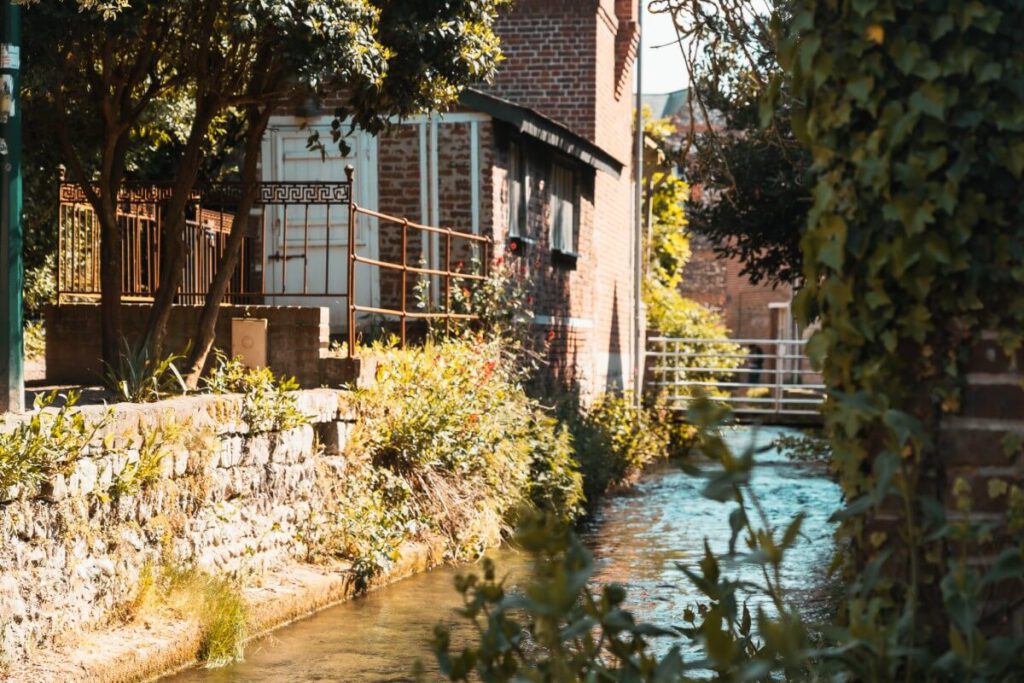
Lots of cress grows at the source of the stream, which you can also buy in its processed form from the locals at a local stall. There are many caf├®s and restaurants in the center of the village.
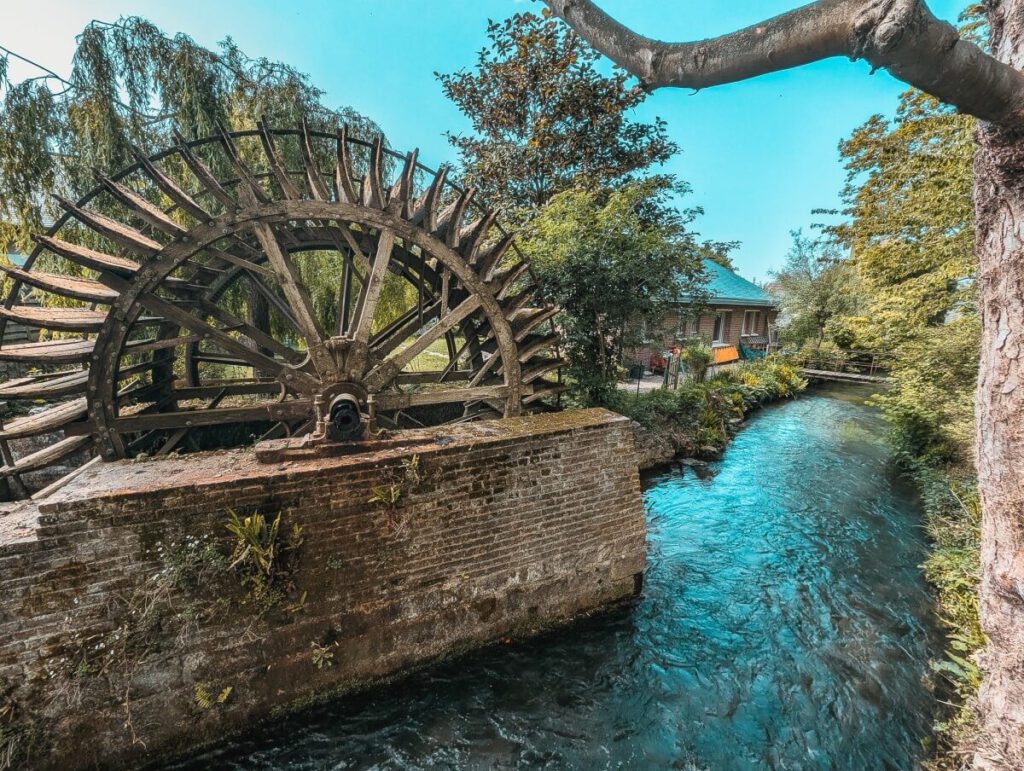
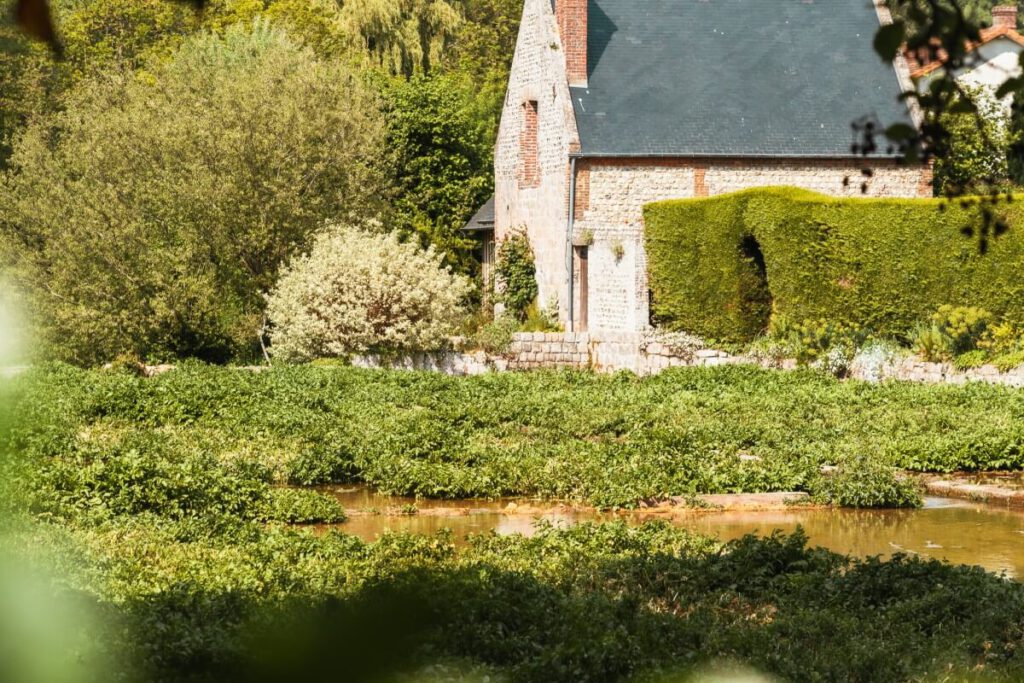
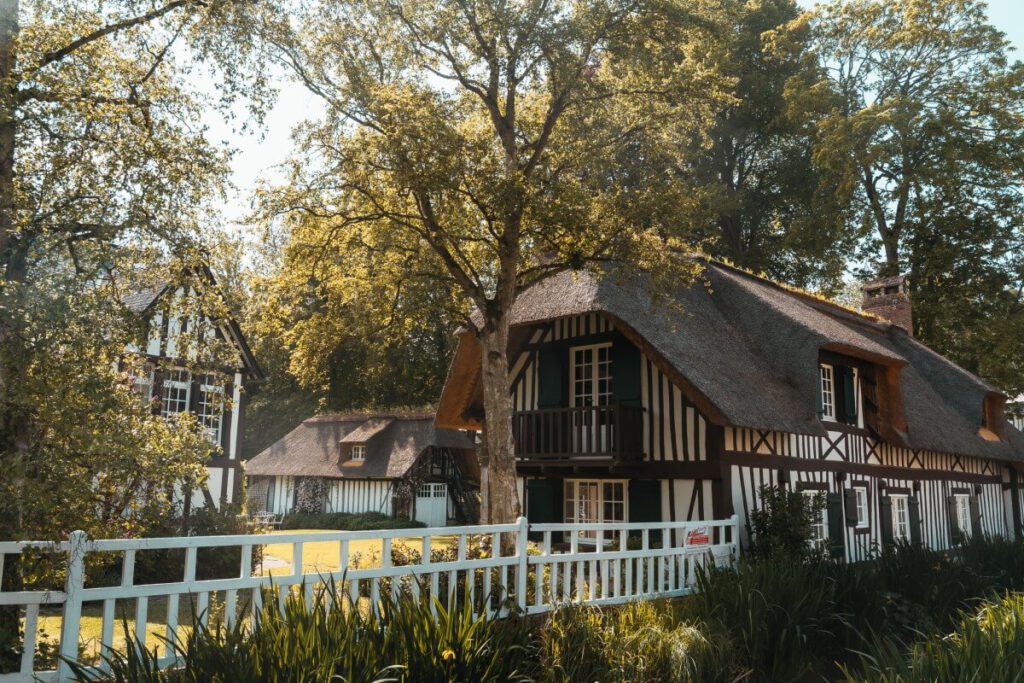
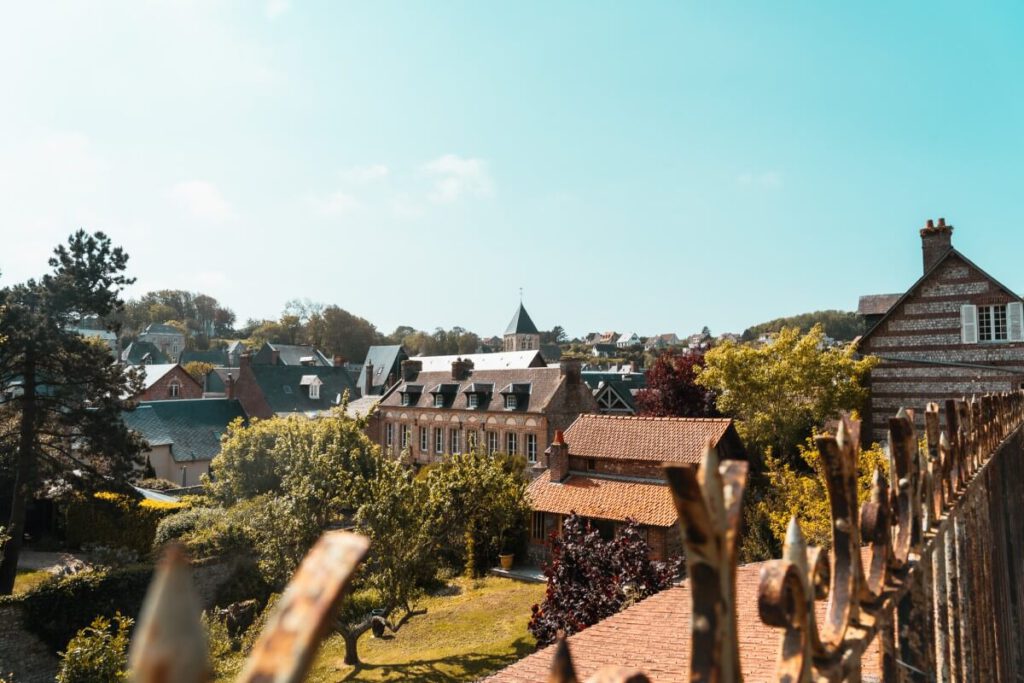
As Veules-les-Roses is very popular, there is usually quite a lot going on here. Whole groups of tourists are brought here by bus and the many parking spaces on site are often full, especially at the weekend.
If you want to explore the town without all the hustle and bustle, then an overnight stay in Veules-les-Roses is a good idea. The Relais H├┤telier Douce France is ideal for this. The hotelŌĆÖs old house is located directly on the river and exudes historical charm.
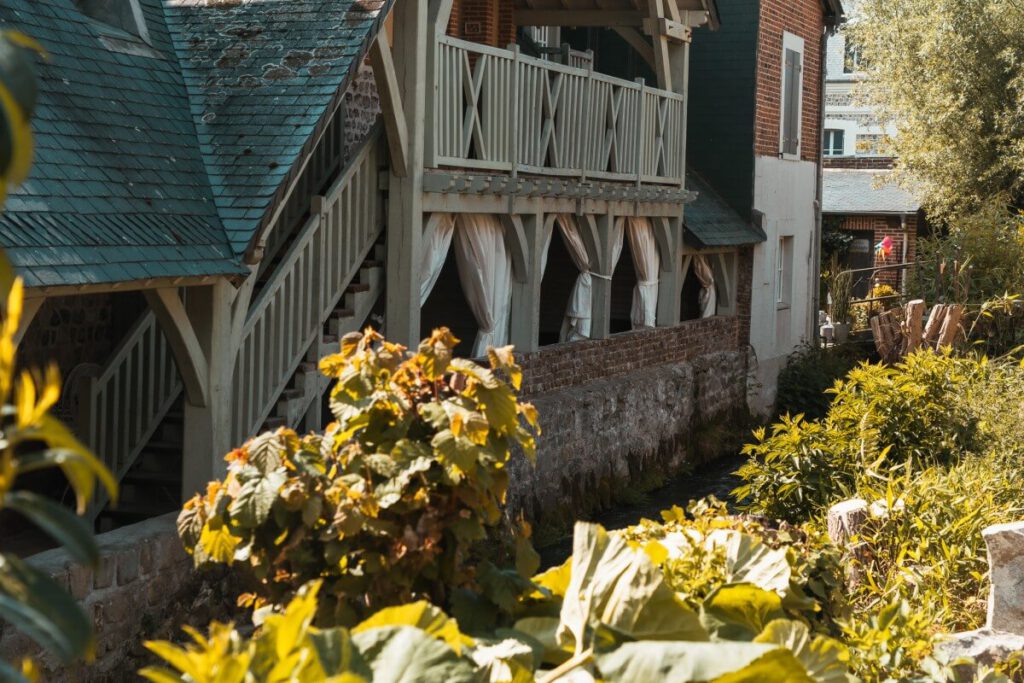
3. Veules-les-Roses to F├®camp
- Day 4: 1 overnight stay
- Accommodation tip: Hotel Le Grand Pavois in F├®camp
- Campsite tip: Camping Bel Air Village de Reneville
From Veules-les-Roses, you cycle a slightly longer section to F├®camp (approx. 50 km). Along the way, you can take a break at the beautiful beaches and cliffs of the Alabaster Coast.
Plage de Saint-Pierre-en-Port
A beautiful and less crowded stopover on the way west is the Plage de Saint-Pierre-en-Port. It is a typical bay for the region: a pebble beach framed by steep cliffs in a sheltered location ŌĆō but with far fewer tourists than the tourist hotspots.
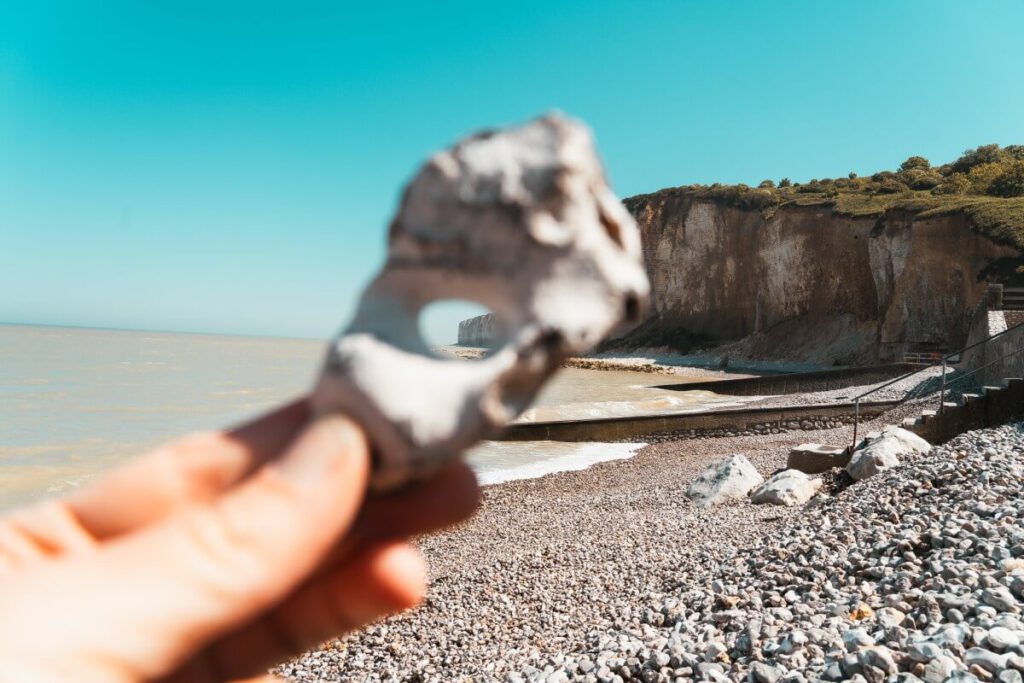
You can also swim here, but simply sitting on the bench, watching the waves and collecting a few oddly shaped pebbles is a lot of fun.
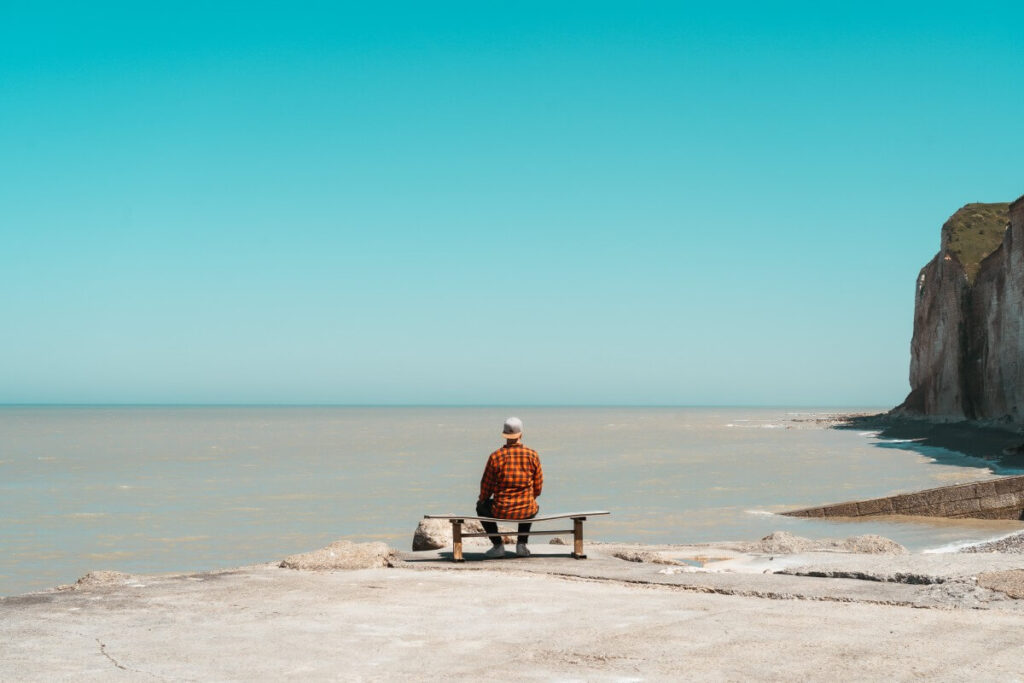
I loved the proximity to nature here. During my visit, there were only a few toilets and a mobile cart with street food, but otherwise no major tourist facilities.
F├®camp
Your first view of F├®camp is at Cap Fagnet, at least if you are traveling from the east. There is an old bunker complex here, a remnant of the German Atlantic Wall from the Second World War. A few signs provide historical information about the site. The view over the city and the bay is spectacular.
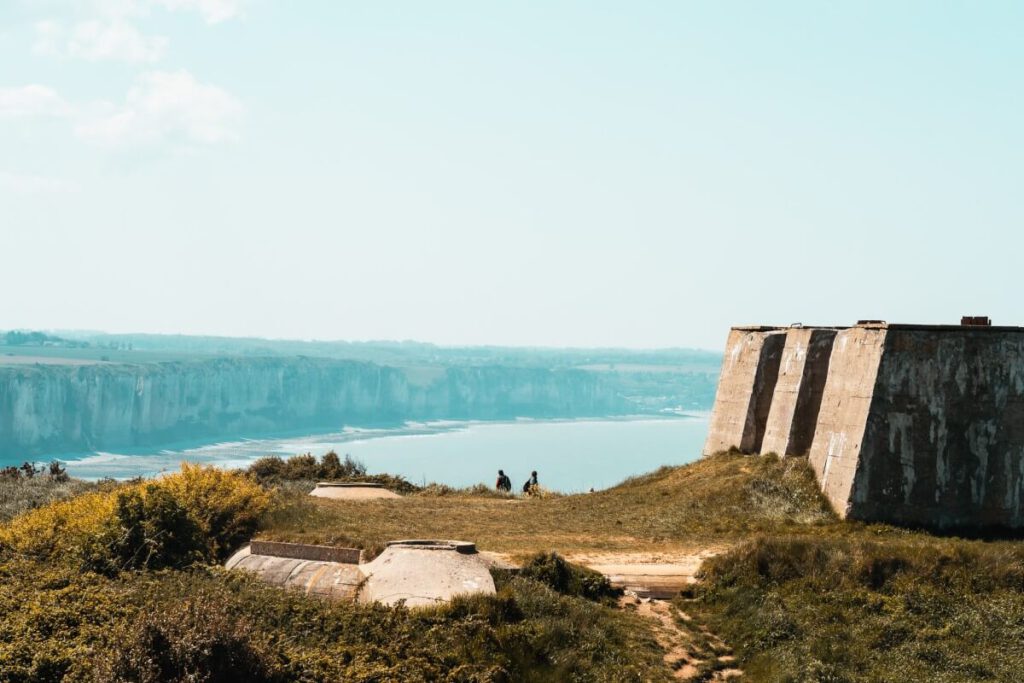
F├®camp itself is best known for the Palais B├®n├®dictine. This building dates back to the 19th century and is actually a mixture of distillery, palace and museum. The famous B├®n├®dictine liqueur is produced here. There are a few English-speaking guided tours every day, which are best booked online in advance. The Connoisseur Experience includes a visit to the distillery, the museum and a tasting.
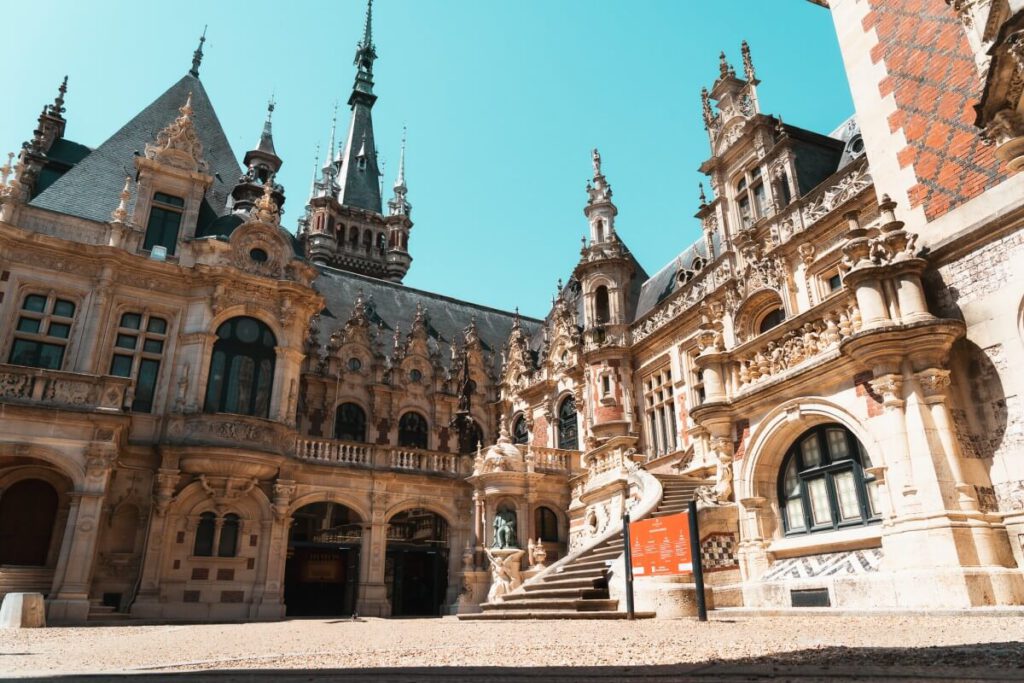
In F├®camp, it is also worth visiting the fishing museum, the Abbatiale de la Sainte Trinit├® and, of course, the marina with its lighthouse.
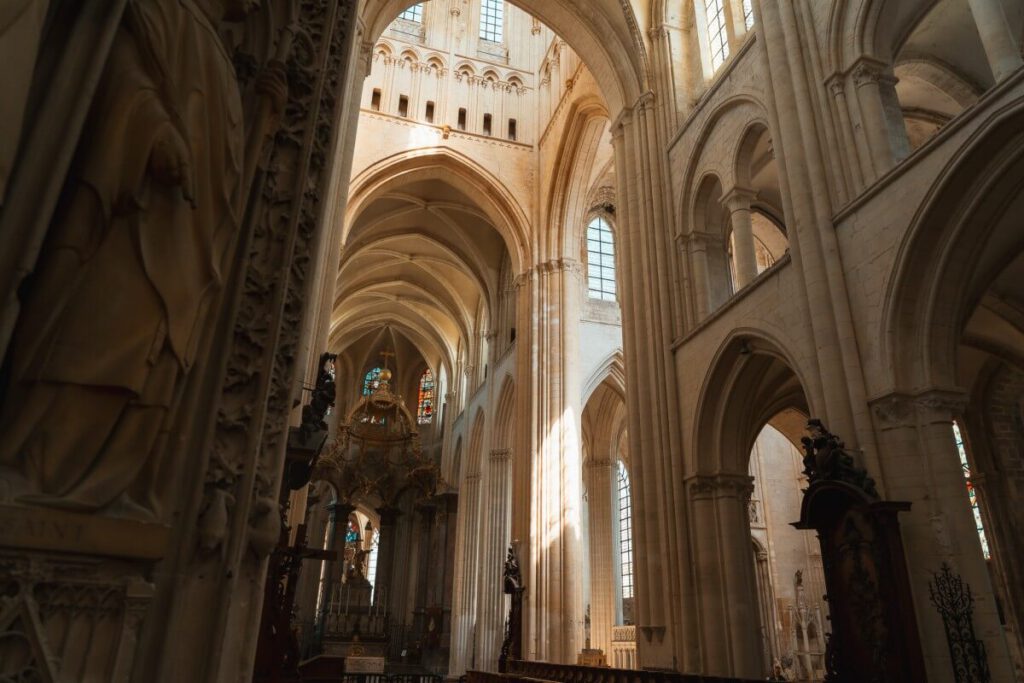
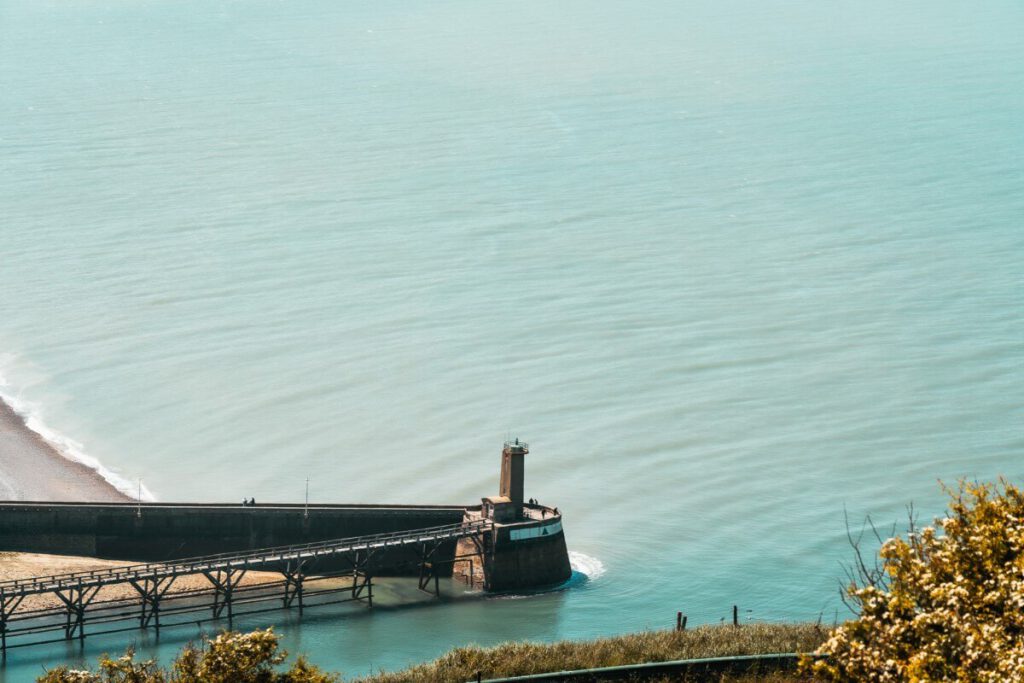
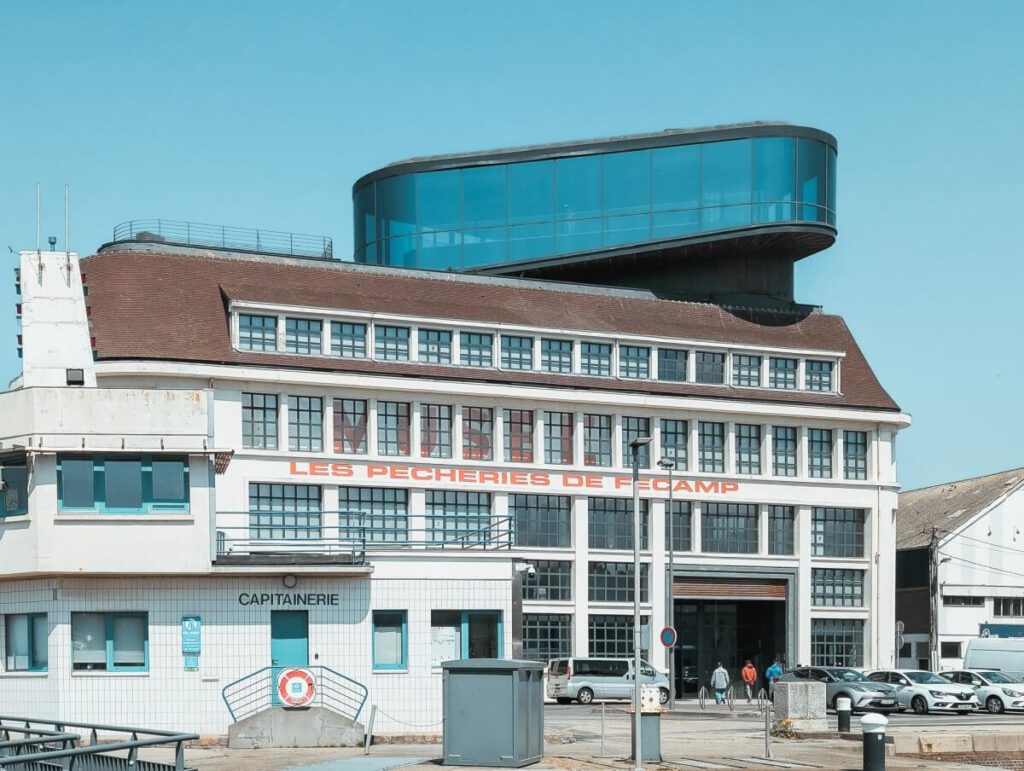

4. F├®camp to ├ētretat
- Day 5 and Day 6: 2 overnight stays
- Accommodation tips:
- Hotel Le Rayon Vert directly on the beach in a 19th century building
- Dormy House above the cliffs of ├ētretat
- Les Tilleuls Etretat ŌĆō really cozy boutique hotel in the middle of town
- Camping tip: Camping Abijune
We continue along the coastal road to ├ētretat, which is probably the absolute highlight of the Alabaster Coast for most visitors. I therefore recommend staying here for at least a whole day, ideally with 2 overnight stays. But before that, there are a few possible intermediate destinations that are also worth a look.
Yport
Yport is best known as a picturesque fishing village with a maritime character and a pebble beach with colorful boats and blue and white striped beach houses.
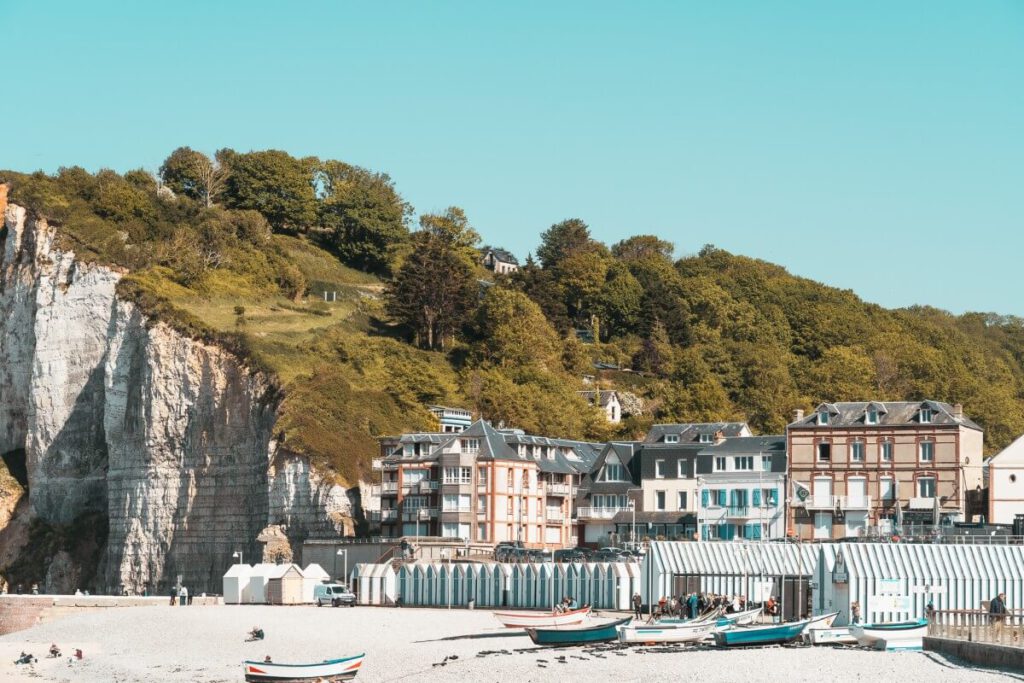
ItŌĆÖs worth a visit to walk along the beach, eat a crepe at one of the stalls and explore the town center a little.

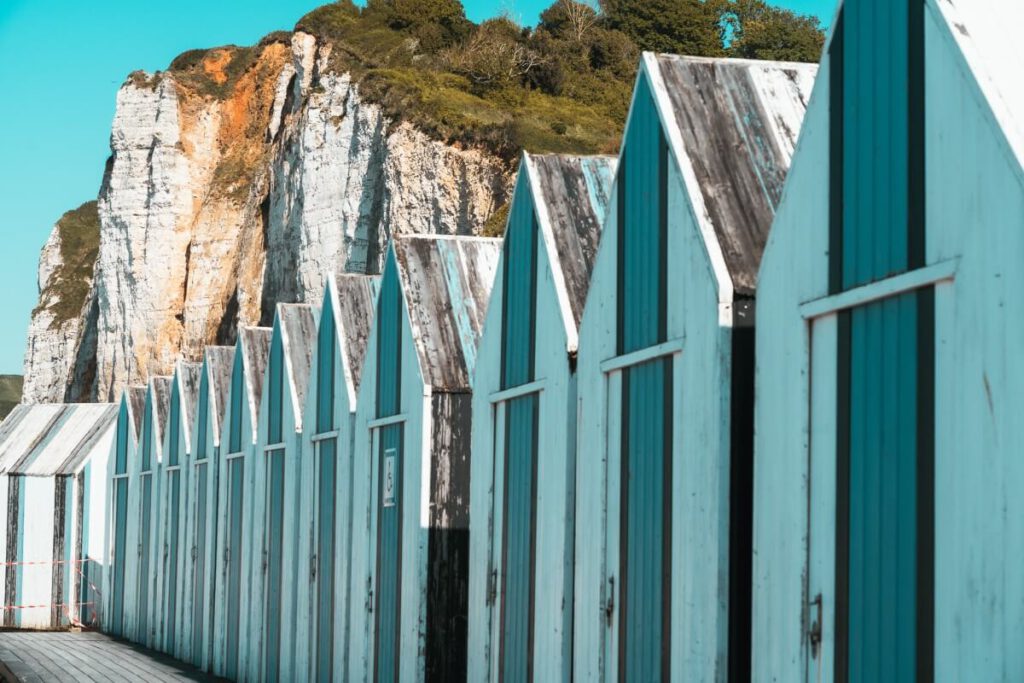
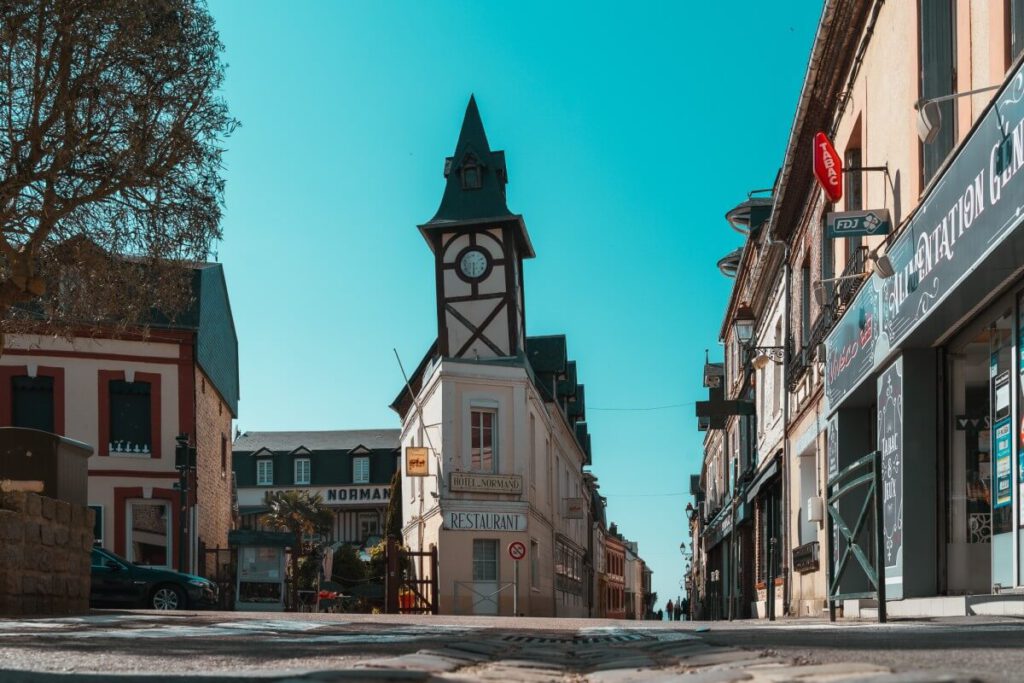
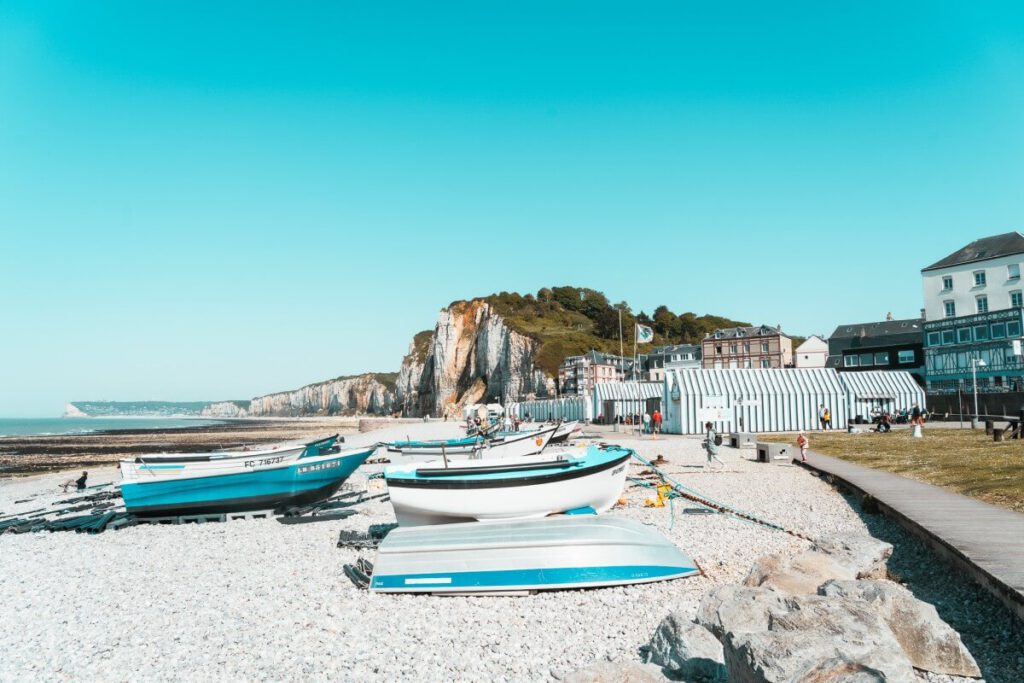
├ētretat
├ētretat is one of the most beautiful, but also one of the most crowded places on the entire Alabaster Coast. Nevertheless, it is definitely worth a visit. It is the highlight for many visitors to this region.
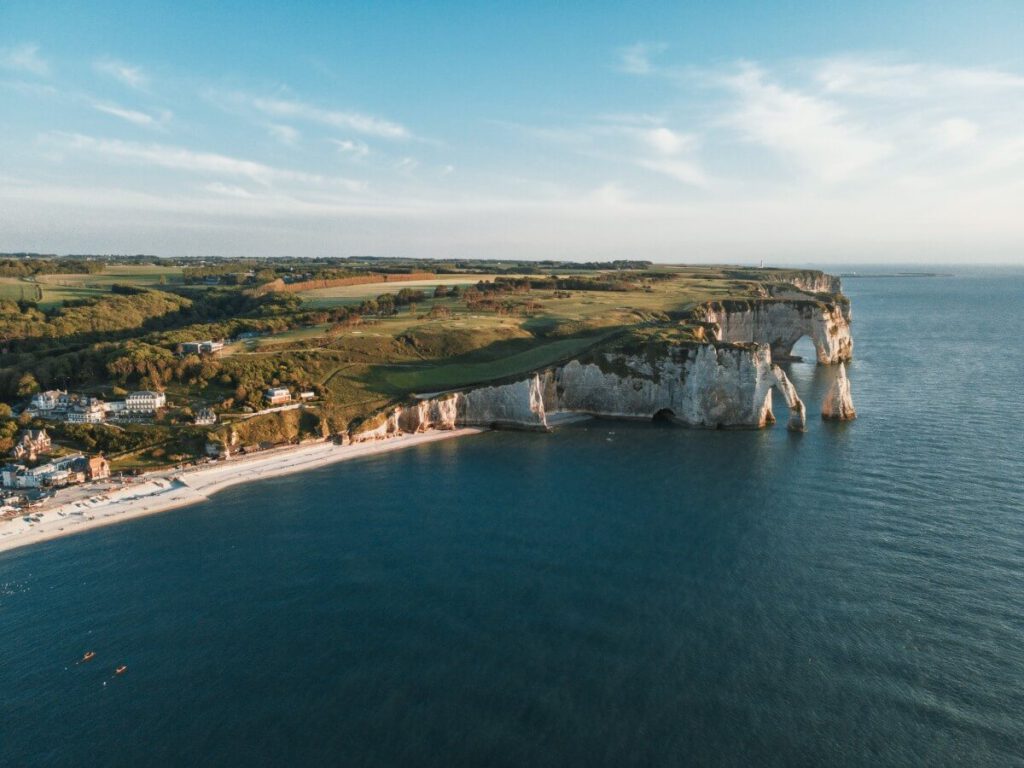
If you come here on a weekend and then also in the most glorious weather, you probably wonŌĆÖt be able to avoid thousands of other visitors. At least thatŌĆÖs how I felt during my visit. But I still found it very beautiful because the coast here is particularly spectacular with its striking rock formations, arches and needles.
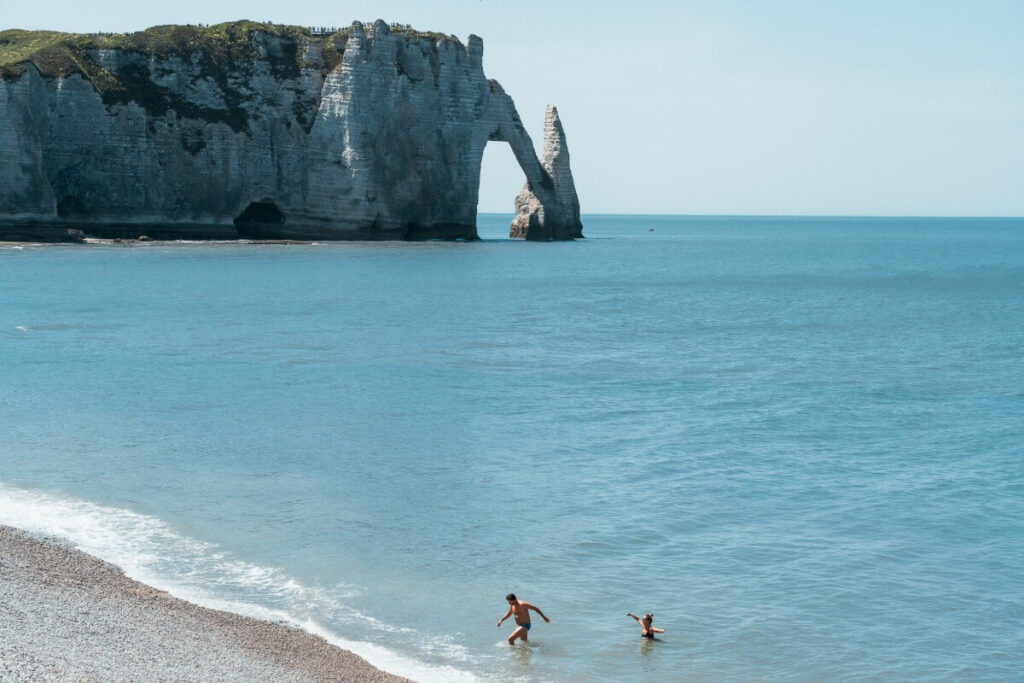
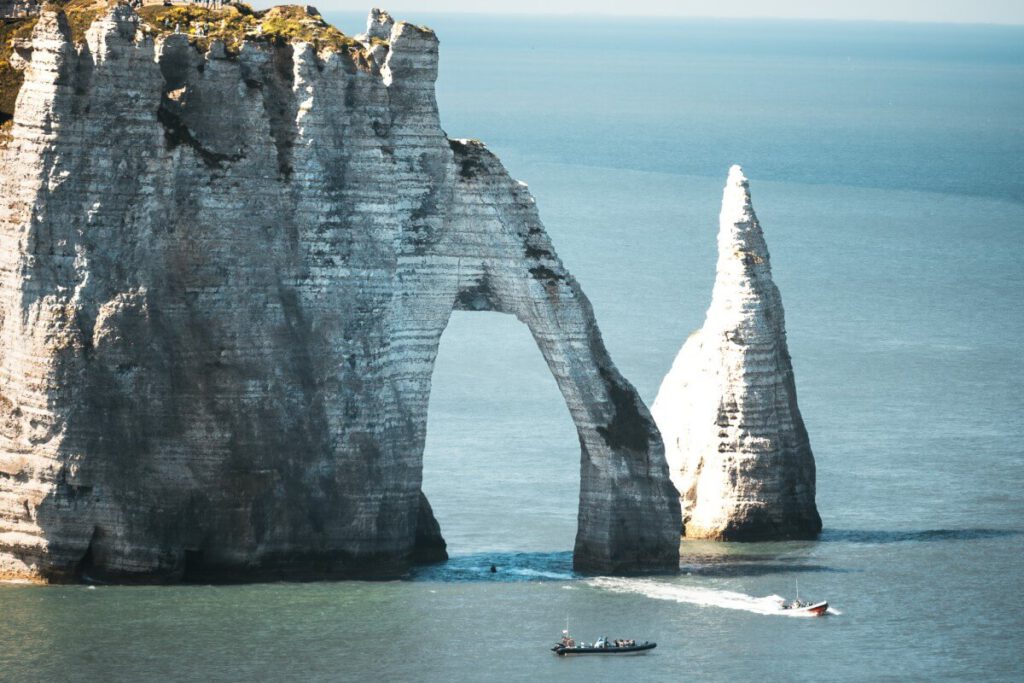
In my opinion, the evening atmosphere is really phenomenal when the limestone cliffs turn a soft yellow-orange. But the atmosphere here is also really brilliant in the morning.
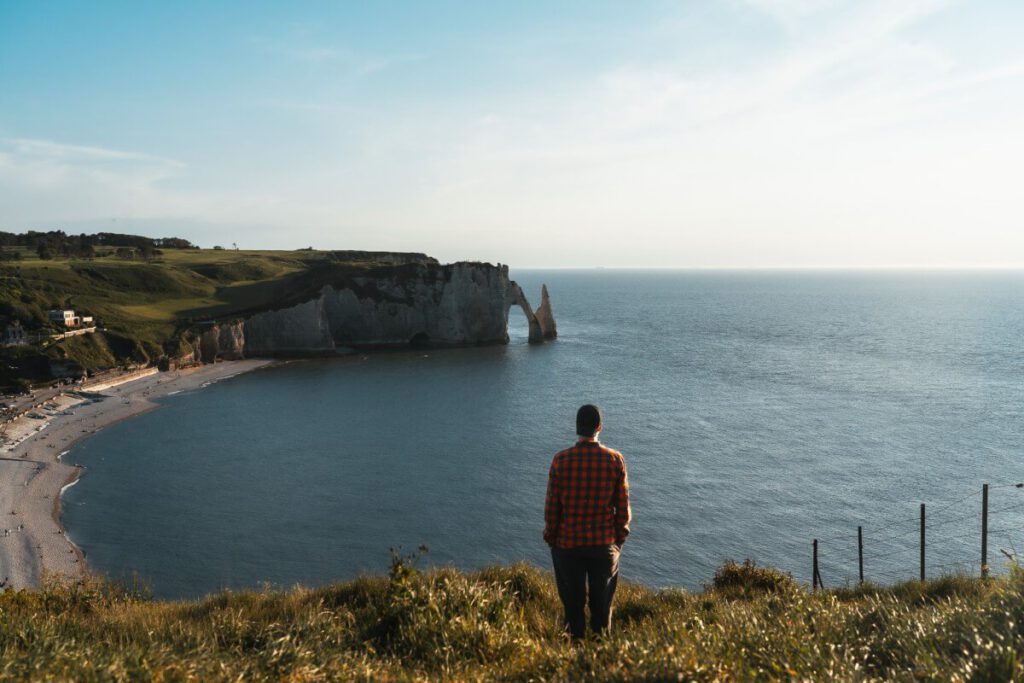
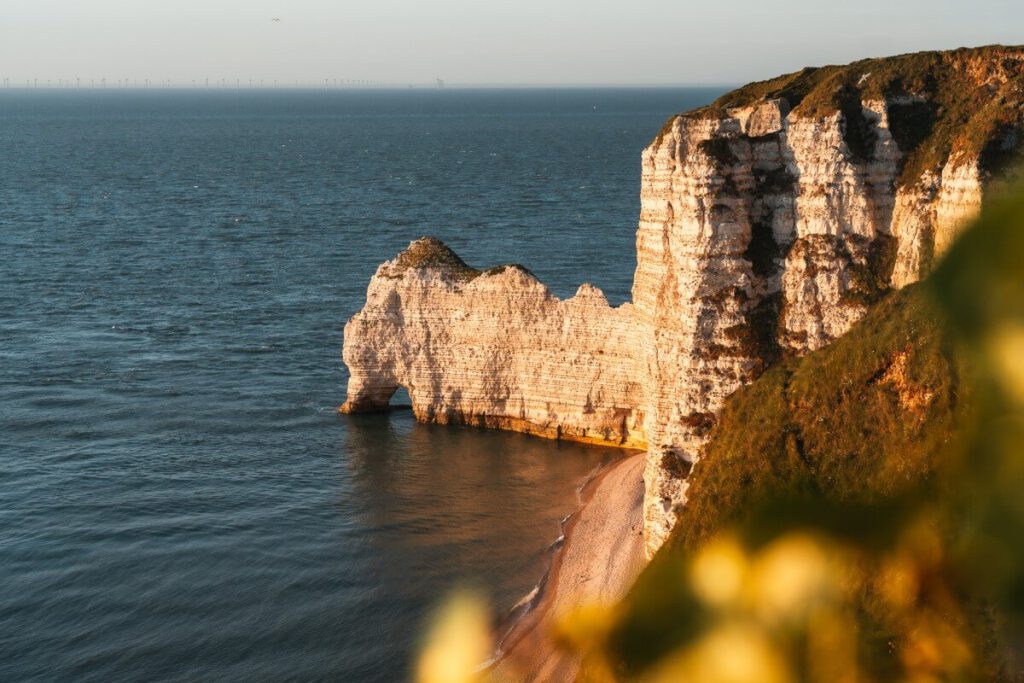
The best place to stay is somewhere nearby. ItŌĆÖs only a 15-minute bike ride from Camping Abijune to the beach. But even if you need more comfort, youŌĆÖll find plenty of great boutique hotels in ├ētretat itself, as well as cheaper accommodation.
One highlight is a hike along the coastal hiking trail. Here you hike across the high plateau from where spectacular coastal views await you, such as the Porte dŌĆÖAval rock gate and the LŌĆÖAiguille rock needle.
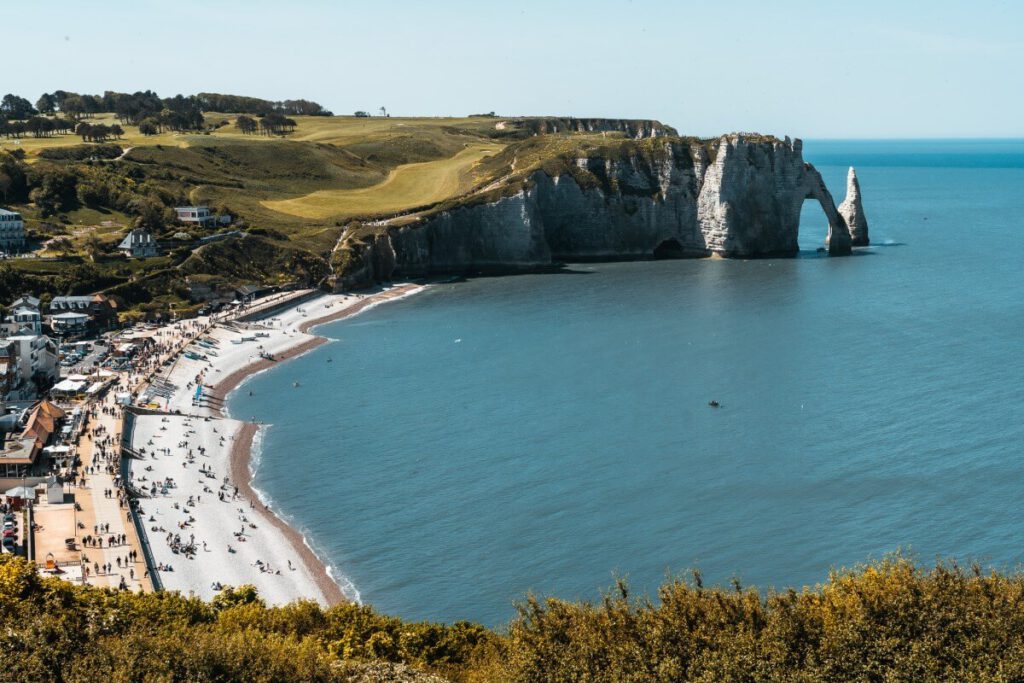
However, there are so many tourists on the trail that some places have now been closed. There have also been some treacherous falls. On the cliffs themselves, access to all caves, including the Chambre des Demoiselles at the Porte dŌĆÖAval and the Descente au Chaudron at the Porte dŌĆÖAmont, is prohibited. On the high plateau paths of the two rock arches, a minimum distance of five meters from the edge of the cliff must be maintained. Anyone who ignores these regulations or crosses barriers risks a fine of 135 euros.
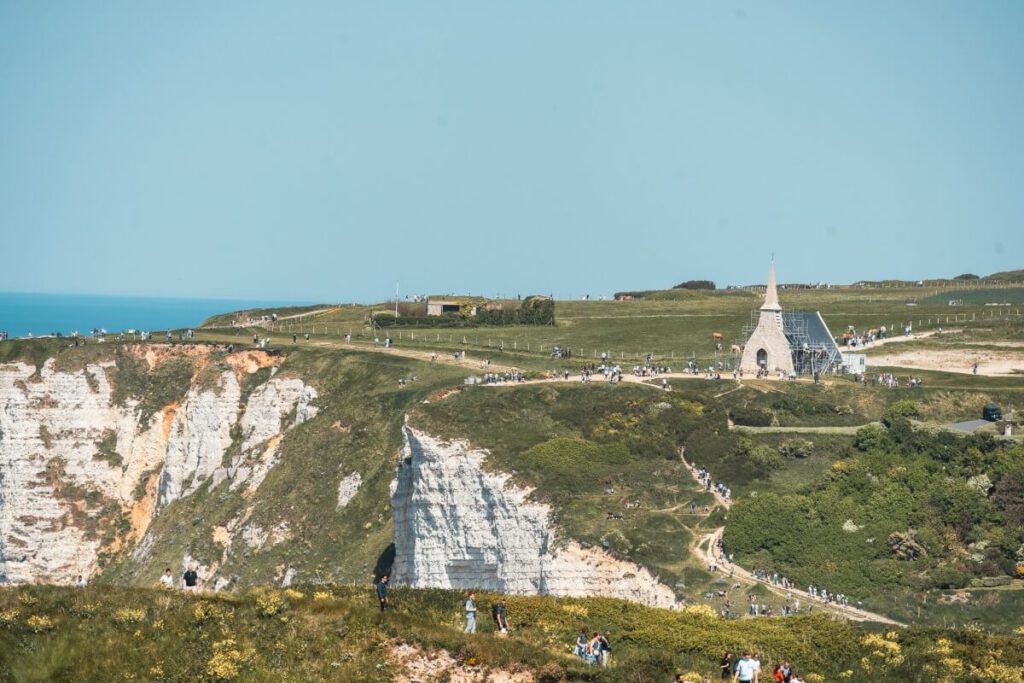
Another highlight is the Jardins dŌĆÖEtretat. For an entrance fee of Ōé¼12.90, you can enjoy a mixture of artistically cut plant sculptures, modern works of art and a spectacular view of the coastal landscape.
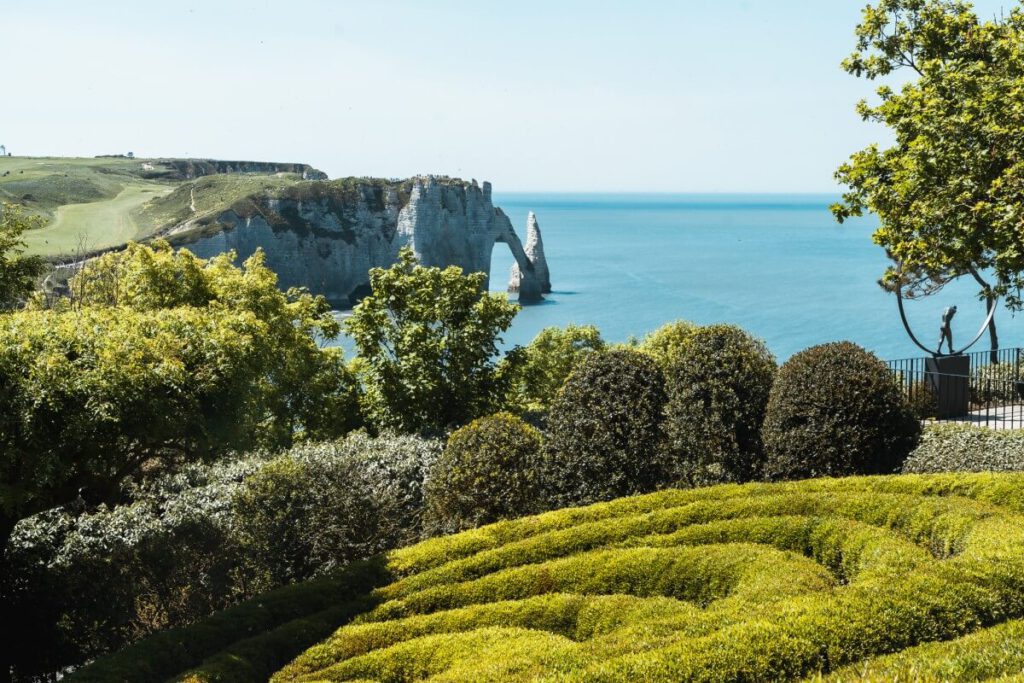
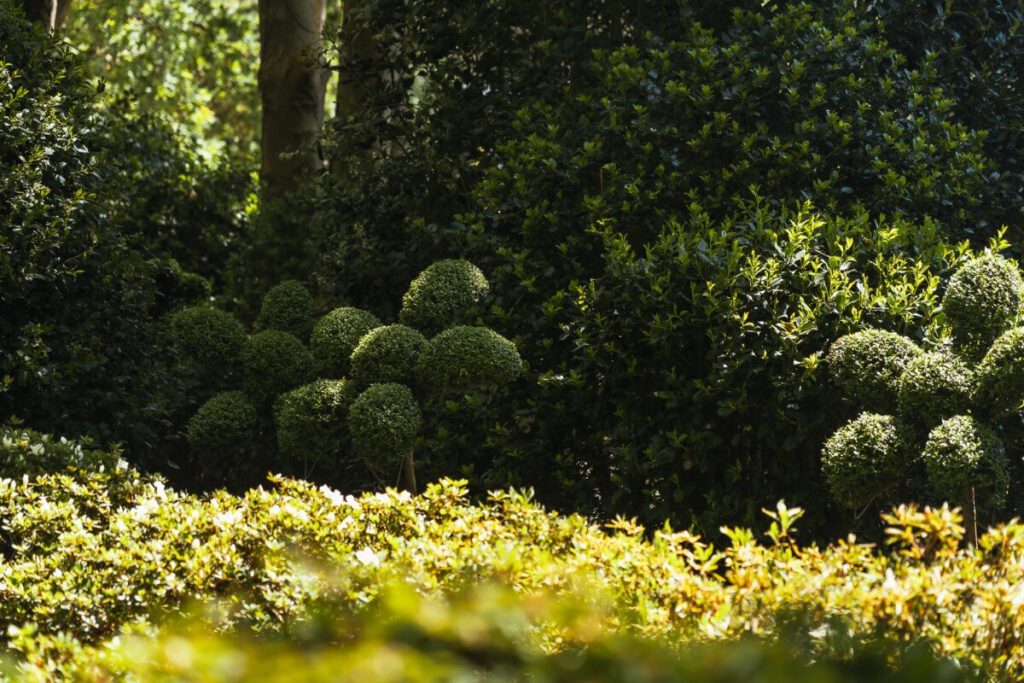
5. Le Havre
My road trip ends in ├ētretat. However, the Alabaster Coast actually continues to Le Havre, the largest city in Normandy, with a little less than 200,000 inhabitants and a major port.
The city center of Le Havre was rebuilt after the Second World War under the direction of Auguste Perret and has been under UNESCO protection since 2005. The city is definitely worth a visit, but on this road trip I focused more on natural highlights and smaller towns.
If you would like to visit Le Havre, you can find a great Le Havre article by Nadine here (in German).
As you can see, the Alabaster Coast really does offer many great highlights. Have you ever been here yourself or are you planning a trip to this region of Normandy? Then please write me a comment with your suggestions or questions.
Tools & services I recommend for your trip:*
📶 Flexible and affordable mobile Internet worldwide
🚁 My drone for aerial photography
🚗 Find and compare cheap rental cars
🎟 Find and book cool activities
🔒 Secure Internet connection with NordVPN
*Note: These links are affiliate links. If you book through them, I will receive a small commission without it being more expensive for you. A purchase from you via these links helps me to continue offering free content without annoying ads on this website. Thank you for your support! I really appreciate it!

